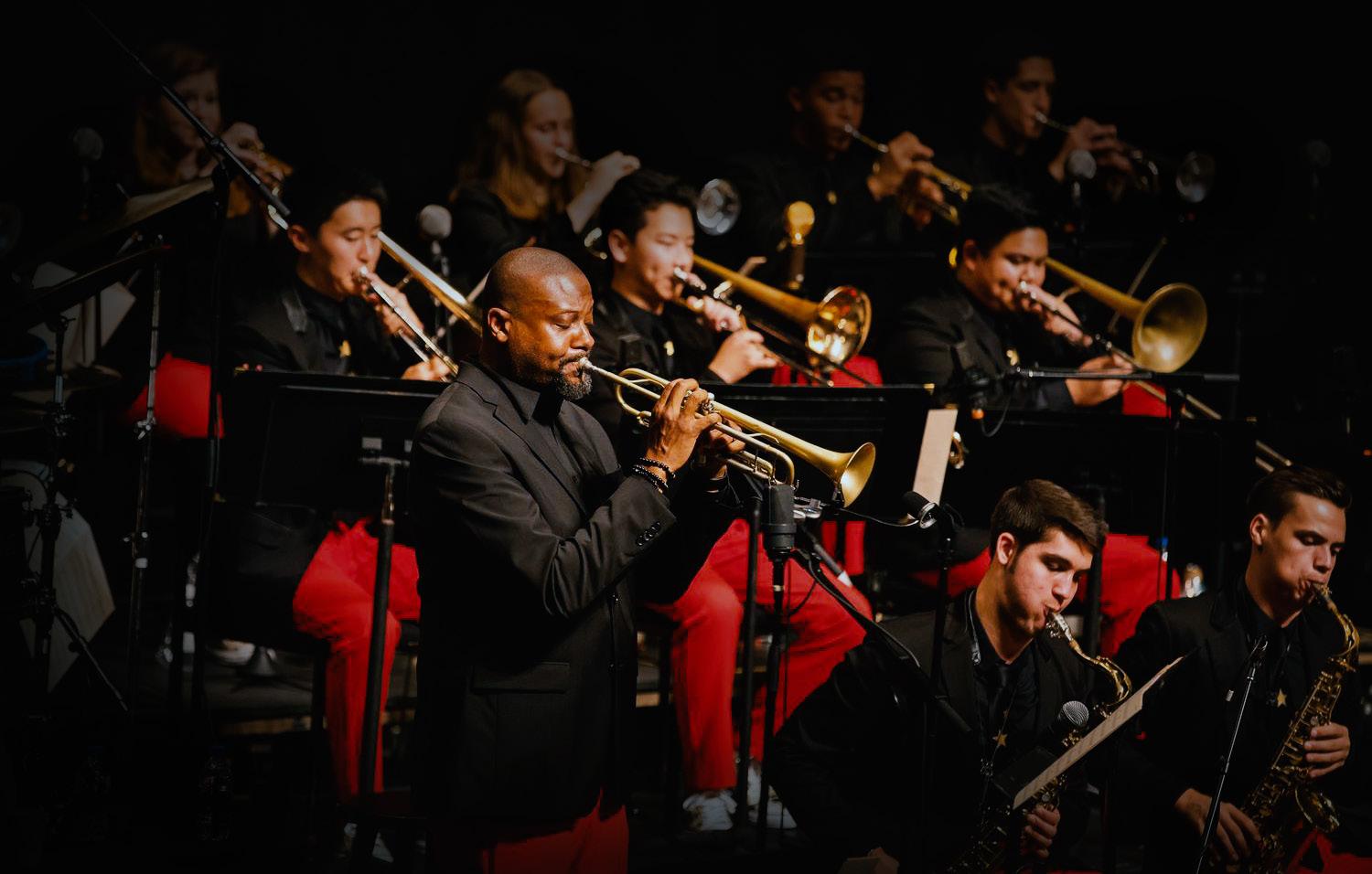
JerseyJazz MAY 2021 VOLUME 49 ISSUE 05 THE MAGAZINE OF THE NEW JERSEY JAZZ SOCIETY
NYO JAZZ
DEVELOPING FUTURE STARS
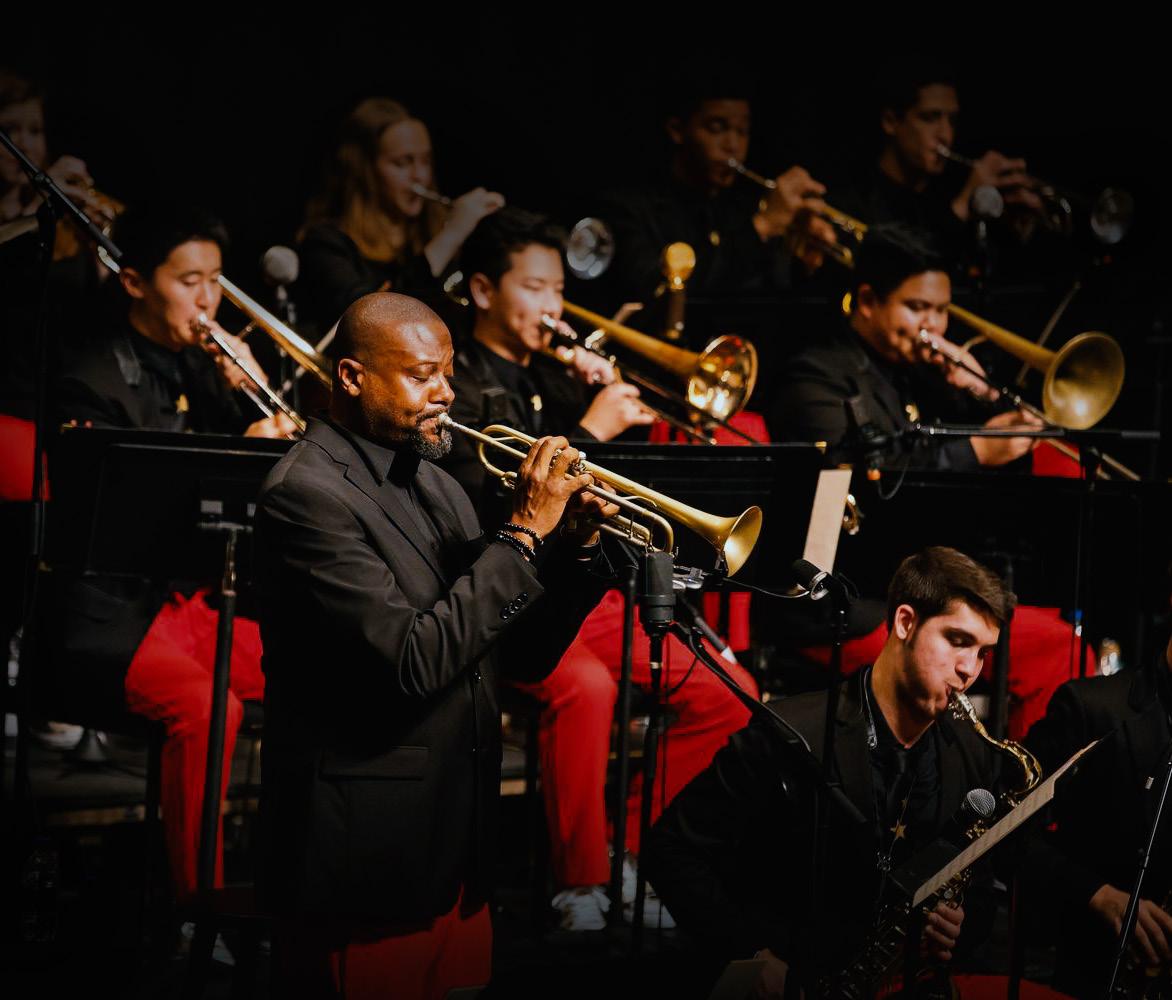
02 MAY 2021 JERSEY JAZZ NJJS.ORG
ARTICLES/REVIEWS 08 Yoko Miwa’s Songs of Joy 12 NYO Jazz 17 Talking Jazz: Boris Kozlov 24 The Django Legacy: Stephane Wrembel 29 Rising Stars: Tyler Henderson and Summer Camargo 34 Remembering Andy Fusco and Bob Porter 37 Other Views COLUMNS 03 All That’s Jazz 05 Editor’s Choice 33 Dan’s Den 41 Jazzwords ON THE COVER NYO Jazz Dress Rehearsal led by Sean Jones.
BY TODD ROSENBERG.
IN THIS ISSUE
PHOTO
ALL
BY CYDNEY HALPIN
Springtime is the season of renewal, it means growth, it means rejuvenation and it means new life. This time of rebirth seems particularly poignant this year, as venues, musicians and patrons cautiously yet optimistically look to a post-Covid future.
The board and I wish you a happy and healthy spring, and look forward to seeing you at many of the upcoming events planned for spring and summer. Be sure to read this issue of Jersey Jazz thoroughly to not miss any of the wonderful concerts and events ahead.
The season of spring has been a powerful inspiration for some of the most influential songwriters in history. I thought it would be fun to Google “Jazz songs with spring in the title” and I came across this fabulous list compiled by music journalist Adam Feibel. You can find all of these songs/renditions
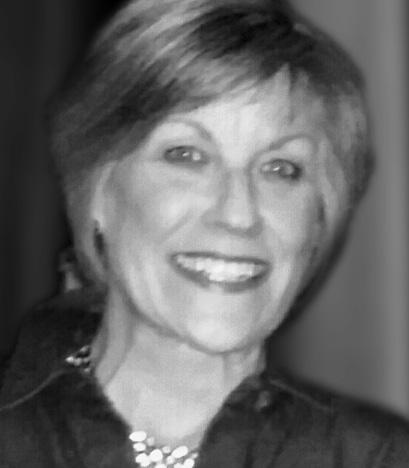
on YouTube, or perhaps many of you have the recordings. ENJOY!
Ella Fitzgerald—“Spring Can Really Hang You Up the Most” and “Spring is Here,” Tony Bennett and Bill Evans—“You Must Believe in Spring,” Nina Simone—“Another Spring,” Django Reinhardt—“Swingtime in Springtime,” Brad Mehldau—“It Might as Well Be Spring,” Miles Davis—“I’ll Remember April,” Wynton Marsalis—“Spring Will Be a Little Late This Year,” Freddie Hubbard—“Up Jumped Spring,” Clifford Brown—“Joy Spring,” Sarah Vaughan—“Come Spring,” and Blossom Dearie—“They Say It’s Spring.”
One of the greatest privileges of serving as NJJS President is the opportunity to meet and collaborate with jazz visionaries, be they musicians, teachers, scholars, cheerleaders, or patrons, and often they are all of these things combined.
Such is the case with Ted Chubb who I’m pleased to announce has joined the NJJS Advisory board.
Ted holds a holds a Master of Music from Rutgers University and is the Director of Cultural Programming and Jazz House Summer Workshop for the community arts organization Jazz House Kids. Both an artist and educator, Ted has built a career on collaboration and has been an instrumental part of the growth of JHK from a great local/regional program into a nationally recognized organization.
As NJJS looks to bolster our educational partnerships and programming, we’re very excited to have Ted bring his skills and enthusiasm to future endeavors. Please join me in welcoming Ted to the NJJS community.
J
ersey Jazz Magazine is a wonderful benefit of NJJS membership and after several months
of transition with our new website, it has been password protected with full accesses available once again to NJJS members only.
Each month, you’ll receive a new password when you receive the eBlast containing the link to the current month’s issue. You’ll be prompted to input the password after you click on the “View Digital Issue” tab. Once you’ve accessed the magazine, you’ll be able to download it to your computer or other personal device for ease of access throughout the month. If you prefer not to download the issue, keep the monthly password handy so you can continue to access the issue online. If you have any questions, please contact me at pres@njjs.org.
The jazz world lost a great advocate and NJJS lost a great friend with the death of WBGO on air personality Bob Porter. Bob had been
03 MAY 2021 JERSEY JAZZ NJJS.ORG
THAT’S JAZZ
“ SPRINGTIME ... SEEMS PARTICULARLY POIGNANT THIS YEAR AS VENUES, MUSICIANS AND PATRONS CAUTIOUSLY, YET OPTIMISTICALLY, LOOK TO A POST-COVID FUTURE. ”
on this incredible opportunity!!
Need something from Amazon? Groceries, a gift, new patio furniture? I’d like to remind you that NJJS is part of the AmazonSmile Gives program where 0.5% of the price of you eligible purchases goes directly to NJJS!
a decades long NJJS member and had served as an advisor for almost as long. The board and I send our deepest condolences to his wife, Linda, and to the myriad of musicians, colleagues, family and friends who shared Bob’s love and knowledge of jazz. Please see page 35 for more information on Bob’s life and legacy.
If you missed the April Social honoring the life and legacy of Lionel Hampton, it’s currently available for viewing on the homepage of our website. The show includes conver-
sation and anecdotes with the New Lionel Hampton Big Band co-leaders, Christian Fabian, Lance Bryant and Jason Marsalis, as well as historic video clips of Hamps and his band, along with clips from the current band. Don’t miss this very informative and enjoyable presentation.
Mosaic™ Box Sets for Sale NJJS has received two incredibly generous donations of used Mosaic™ Limited Edition Box Sets, one from Robin Sinkway, the niece of the late, devoted NJJS mem-
ber Jack Sinkway, and the other from Jean Field. We thank both families for their kindness and stewardship.
Prized by collectors for their superior audio quality, most of these CD sets are in mint to very good condition and would make a great addition to your music collection, with proceeds helping NJJS continue to promote and present jazz. For more information on the titles for sale and prices, please visit our website www.njjs,org/Donate/Merchandise or contact via email JazzEducation@njjs.org. DON’T MISS OUT
It’s the same Amazon you know but a separate website. Same products, same service —but to generate financial donations to NJJS, you must ALWAYS SHOP AT smile.amazon,com.
Log on to www.smile.amazon.com and select New Jersey Jazz Society as your beneficiary, then shop as your normally do. Please tell your friends and family members about this amazing opportunity for NJJS and thank you in advance for your support.

04 MAY 2021 JERSEY JAZZ NJJS.ORG
THAT’S JAZZ
ALL
EDITOR’S CHOICE
BY SANFORD JOSEPHSON

Jazz—Live and Remote— Inches Back Toward Normalcy
The “Talking Jazz” article in the April issue of Jersey Jazz Magazine featured bassist John Lee, who spent 10 years with Dizzy Gillespie and continues to front several Gillespie tribute bands. He also produces the annual Giants of Jazz concert at the South Orange Performing Arts Center, which he hopes will return this year. On Saturday, May 22, from 7-8 p.m. EDT, Lee will be leading a trio at the New Jersey Jazz Society’s Virtual Social (www. njjs.org). Joining him will be drummer Karl Latham and pianist Alex Collins. Latham performed with tenor saxophonist/flutist Don Braden in August at the last of four 2020 concerts in the Morris Museum’s Jazz on the Back Deck series. AllAbout-
Jazz describes him as “an inventive powerhouse known for his exceptional ability to dig into a variety of musical styles.” Collins, a recipient of the Wynton Kelly Jazz Foundation Award for Jazz Achievement, led the monthly Jazz Jams at Teaneck’s Puffin Cultural Forum for many years.
The Morris Museum series, held on its elevated parking deck with strict pandemic protocols, returned on April 15 with Amani playing the music of Lionel Richie. The museum has scheduled an ambitious 19-concert series running into September. Three concerts are planned in May: trumpeter Mike Davis’ “Belated Bix Beiderbecke Back Deck Birthday Bash” on May 6; clarinetist/tenor saxophonist Dan Levin-
son’s “Singin’ and Swingin’ the Clouds Away” on May 20; and “The Antoinette Montague Experience” on May 27.
Davis, who specializes in playing the music of the 1920s, was scheduled to celebrate Beiderbecke’s birthday on March 6, 2020, at the Morris Museum’s Bickford Theatre, but that concert was canceled by the pandemic. Levinson will headline three concerts in the Back Deck series. His May performance will concentrate on the upbeat music performed by stars of the past such as Louis Armstrong, Fred Astaire, and Judy Garland. Montague will explore the American Songbook, backed by Danny Mixon on piano, Melissa Slocum on bass, and McClenty Hunter on drums. The May Morris Museum concerts will begin at 7 p.m., but performances in June-August will start at 8 p.m., reverting to 7 p.m. in September.
Shanghai Jazz in Madison resumed outdoor performances in March and will feature pianist Eric
Olsen and harmonicist/vocalist Rob Paparozzi, among others, in May. The last two William Paterson spring Jazz Room at Home virtual concerts will feature the Steve LaSpina Quartet on May 2 and pianist Bill Charlap and tenor saxophonist Houston Person on May 9. The New Brunswick Jazz Project and Tavern on George have kept live music going with heated and ventilated tents and such artists as drummer Winard Harper and vibraphonist Behn Gillece.
And, the Jay and Linda Grunin Center for the Arts in Toms River recently announced the return of live performances to limited capacity in September. The Jazz on a Sunday Afternoon Series, for which NJJS is a media sponsor, will return on October 17 with the Sentimental Journey Big Band (rescheduled from May 31, 2020). The live performances will also be streamed.
Not back to normal yet, but moving in the right direction.
05 MAY 2021 JERSEY JAZZ NJJS.ORG
ABOUT NJJS
Founded in 1972, The New Jersey Jazz Society has diligently maintained its mission to promote and preserve America’s great art form—jazz. To accomplish our mission, we produce a monthly magazine, Jersey Jazz ; sponsor live jazz events; and provide scholarships to New Jersey college students studying jazz. Through our outreach program
Generations of Jazz, we provide interactive programs focused on the history of jazz. The Society is run by a board of directors who meet monthly to conduct Society business. NJJS membership is comprised of jazz devotees from all parts of the state, the country and the world.
MEMBER BENEFITS
10 FREE Concerts Annually at our “Sunday Socials”
Monthly Award Winning Jersey Jazz Magazine - Featuring Articles, Interviews, Reviews, Events and More.
Discounts at NJJS Sponsored Concerts & Events.
Discounts at Participating Venues & Restaurants
Support for Our Scholarship and Generations of Jazz Programs
MUSICIAN MEMBERS
FREE Listing on NJJS.org “Musicians
List” with Individual Website Link
FREE Gig Advertising in our Monthly eBlast
THE RECORD BIN
JOIN NJJS
Family/Individual $45
(Family includes to 2 Adults and 2 children under 18 years of age)
Family/Individual 3-Year $115
Musician Member $45 / 3-Year $90 (one time only, renewal at standard basic membership level.)
Youth $15 - For people under 21 years of age. Date of Birth Required.
Give-A-Gift $25 - Members in good standing may purchase unlimited gift memberships.
Applies to New Memberships only.
Fan $75 - $99
Jazzer $100 - $249
Sideman $250 - $499
Bandleader $500+
Corporate Membership $1000
Visit www.njjs.org or email info@njjs.org for more information on our programs and services
A collection of CDs & LPs available at reduced prices at most NJJS concerts and events and through mail order www.njjs.org/Store
Members at Jazzer level and above and Corporate Membership receive special benefits. Please contact Membership@njjs.org for details. The New Jersey Jazz Society is qualified as a tax exempt cultural organization under section 501(c)(3) of the Internal Revenue Code, Federal ID 23-7229339. Your contribution is taxdeductible to the full extent allowed by law. For more Information or to join, visit www.njjs.org
06 MAY 2021 JERSEY JAZZ NJJS.ORG
VOLUME 49 • ISSUE 05
NJJS org
Jersey Jazz (ISSN 07405928) is published monthly for members of The New Jersey Jazz Society P.O. Box 223, Garwood, NJ 07027
908-380-2847 • info@njjs.org
Membership fee is $45/year.
Periodical postage paid at West Caldwell, NJ
Postmaster please send address changes to P.O. Box 223, Garwood, NJ 07027
All material in Jersey Jazz, except where another copyright holder is explicitly acknowledged, is copyright ©New Jersey Jazz Society 2020. All rights reserved. Use of this material is strictly prohibited without the written consent of the NJJS.
Editorial Staff EDITOR
Sanford Josephson, editor@njjs.org
ART DIRECTOR
Michael Bessire, art@njjs.org
INTERNATIONAL EDITOR
Fradley Garner
fradleygarner@gmail.com
CONTRIBUTING PHOTO EDITOR
Mitchell Seidel, photo@njjs.org
CONTRIBUTING EDITORS
Bill Crow, Schaen Fox, Lin Josephson
Joe Lang, Dan Morgenstern, Jay Sweet
CONTRIBUTING PHOTOGRAPHERS
Bill Farrington, Chris Lee, Sara Pettinella
Todd Rosenberg, Casey Ryan.
WEBMASTER
Christine Vaindirlis
Advertising
DIRECTOR OF ADVERTISING
Jane Fuller, advertising@njjs.org
ADVERTISING RATES
Full Page: $135, Half Page: $90, 1/3 Page: $60, 1/4 Page: $30
For reservations, technical information and deadlines contact advertising@njjs.org or visit njjs.org/Magazine/Advertise . Make payment at PayPal.com: payment@njjs.org, or via check made payable to NJJS, P.O. Box 223, Garwood, NJ 07027.
New Jersey Jazz Society, Officers 2021
PRESIDENT
Cydney Halpin, pres@njjs.org
EXECUTIVE VP
Jane Fuller, vicepresident@njjs.org
TREASURER
Dave Dilzell, treasurer@njjs.org
VP, MEMBERSHIP membership@njjs.org
VP, PUBLICITY
Sanford Josephson, sanford.josephson@gmail.com
VP, MUSIC PROGRAMMING
Mitchell Seidel, music@njjs.org
RECORDING SECRETARY
Irene Miller
CO-FOUNDER
Jack Stine
IMMEDIATE PAST PRESIDENT
Mike Katz DIRECTORS
Jay Dougherty, Cynthia Feketie, Pete Grice, Carrie Jackson, Mike Katz, Caryl Anne McBride, Robert McGee, James Pansulla, Stew Schiffer, Elliott Tyson, Jackie Wetcher
ADVISORS
Don Braden, Ted Chubb, Al Kuehn
07 MAY 2021 JERSEY JAZZ NJJS.ORG
Magazine of the New Jersey Jazz Society
YOKO
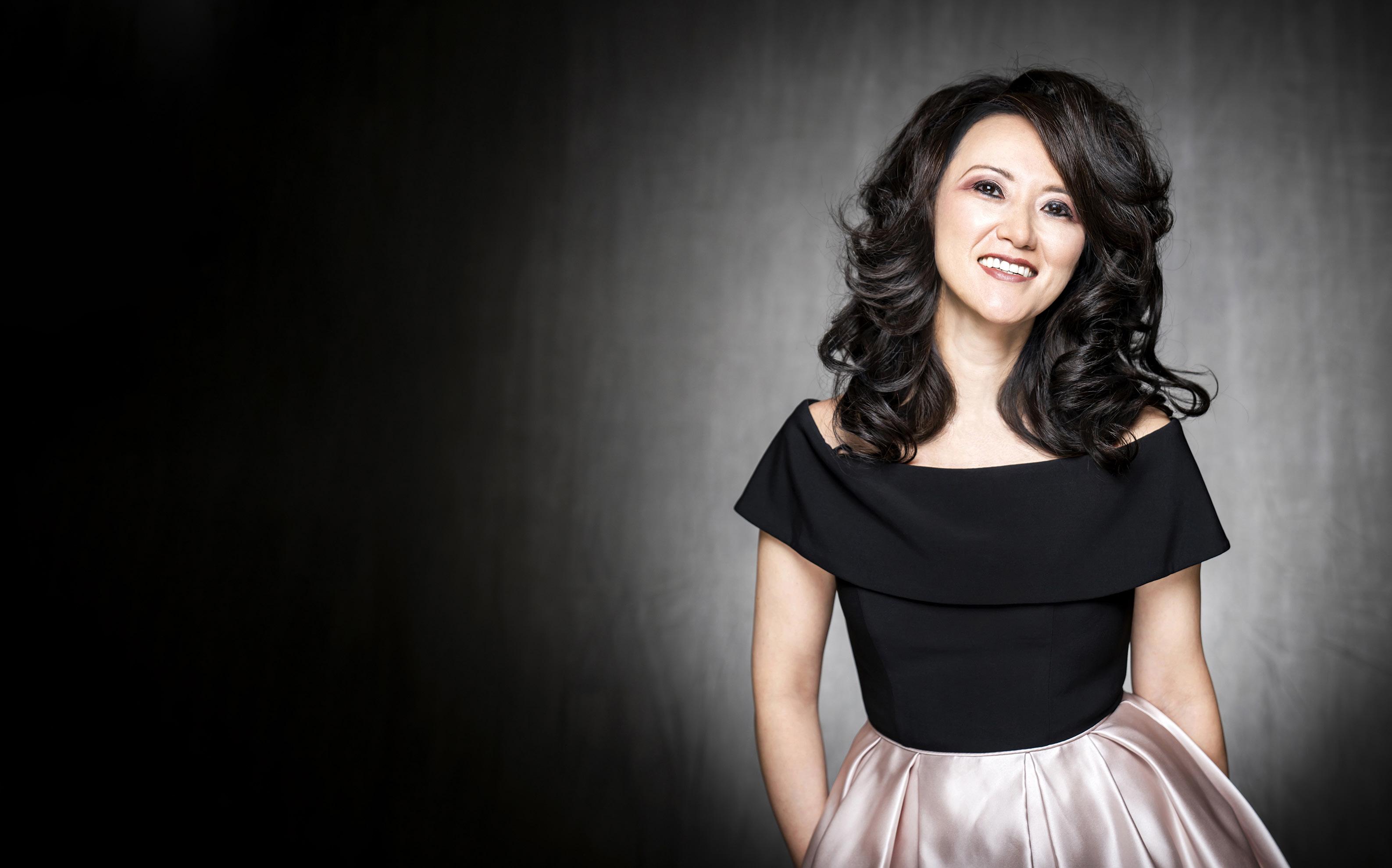
Pandemic-Delayed Album is Festive Follow-Up to Months of Isolation
Inspired by Vocalist Sheila Jordan’s Performance of the Billy Preston Tune from the ‘70s
BY SCHAEN FOX
In December 2019, pianist Yoko Miwa and her trio appeared with vocalist Sheila Jordan at The Mad Monkfish in Cambridge, MA. Jordan sang the Billy Preston tune, “Song of Joy”, and, according to Miwa, “She used this song as an intro to a bebop tune. It stuck with me, and, after playing it with Sheila, I went back to hear the original version and thought, ‘Wow, what a beautiful song!’ The
lyrics are amazing and totally fit with the message I wanted to convey musically: ‘With every note I play, I play with love. With every word I say, it’s coming from my heart.’”
“Song of Joy” became the inspiration for Miwa’s new album, Songs of Joy, on the UK-based Ubuntu Music label. The album was originally scheduled for release in November 2020 but was delayed until February of this year
MIWA’S SONGS OF JOY
08 NJJS.ORG PHOTO BY CHRIS LEE
because of the pandemic. To say the album was a success would be an understatement. Six weeks after its release, it soared to Number 1 on the Jazz Week chart, and, at press time, after nine weeks, it was still at Number 4.
As for reviews, Chicago Jazz Magazine’s Hrayr Attarian wrote that the five originals and six standards “are infused with a captivating exuberance, and Miwa and her trio interpret them with a vibrant virtuosity and elegance. In addition to an infectious cadence and memorable melodies, the music contains intricately woven harmonies and delightful spontaneity.”
AllAboutJazz ’s Dan McClenaghan described Miwa’s interpretation of Billy Preston’s “Song of Joy” this way: “tranquil and warm, as introspective and lovely as a song can be,” adding that “Duke Jordan’s ‘No Problem’ drives hard straight ahead, rollicking and rolling.”

When Miwa went into the recording studio after the pandemic-caused delay, she said she was “nervous since I hadn’t played with my trio from March to July, plus it was unusual to be wearing masks and social distancing. Going into the studio with new, unrehearsed material is very different from what we usually do. We
“ I WAS JUST PLAYING WITH THE IMAGES IN MY HEAD ABOUT HOW I FELT DURING THE
PANDEMIC ... ”
usually play new material at our regular gigs, and, by the time we go into the studio, we know the songs very well. This time, we hadn’t been developing the songs on our gigs, but we have been playing together for many years, so it went very smoothly, and we are all happy the way it came out.”
Once the pandemic began, Miwa’s
goal was to compose something every day. “I decided to write one song every day, no matter what,” she said. “I usually take as much time as I need to write songs; sometimes I can write one pretty quickly but that’s rare. Usually, I write down an idea. Then I work on it the next day. If I don’t like it, I just put the idea away in one of
09 MAY 2021 JERSEY JAZZ NJJS.ORG
YOKO MIWA’S SONGS OF JOY
YOKO MIWA’S SONGS OF JOY
my many composition books. Instead, this time I tried not to overthink it and just play whatever I was feeling in the moment: happy, sad, faster tempo, Latin, swing, etc. I ended up writing too many songs to fit on the album so I had to decide which original compositions would fit in the program along with arrangements of other people’s songs I wanted to include.”
One of her original compositions on the album is “Largo Desolato”, which also happens to be the title of a play by Vaclav Havel. “That was just a coincidence,” she said. “I never heard of the play, but now I want to check it out. I was just playing with the images in my head about how I felt during the pandemic, and long desolation described what I was feeling. Long desolation wasn’t a great title so I just looked for the same words in another language and largo desolato sounded better, plus it seemed to
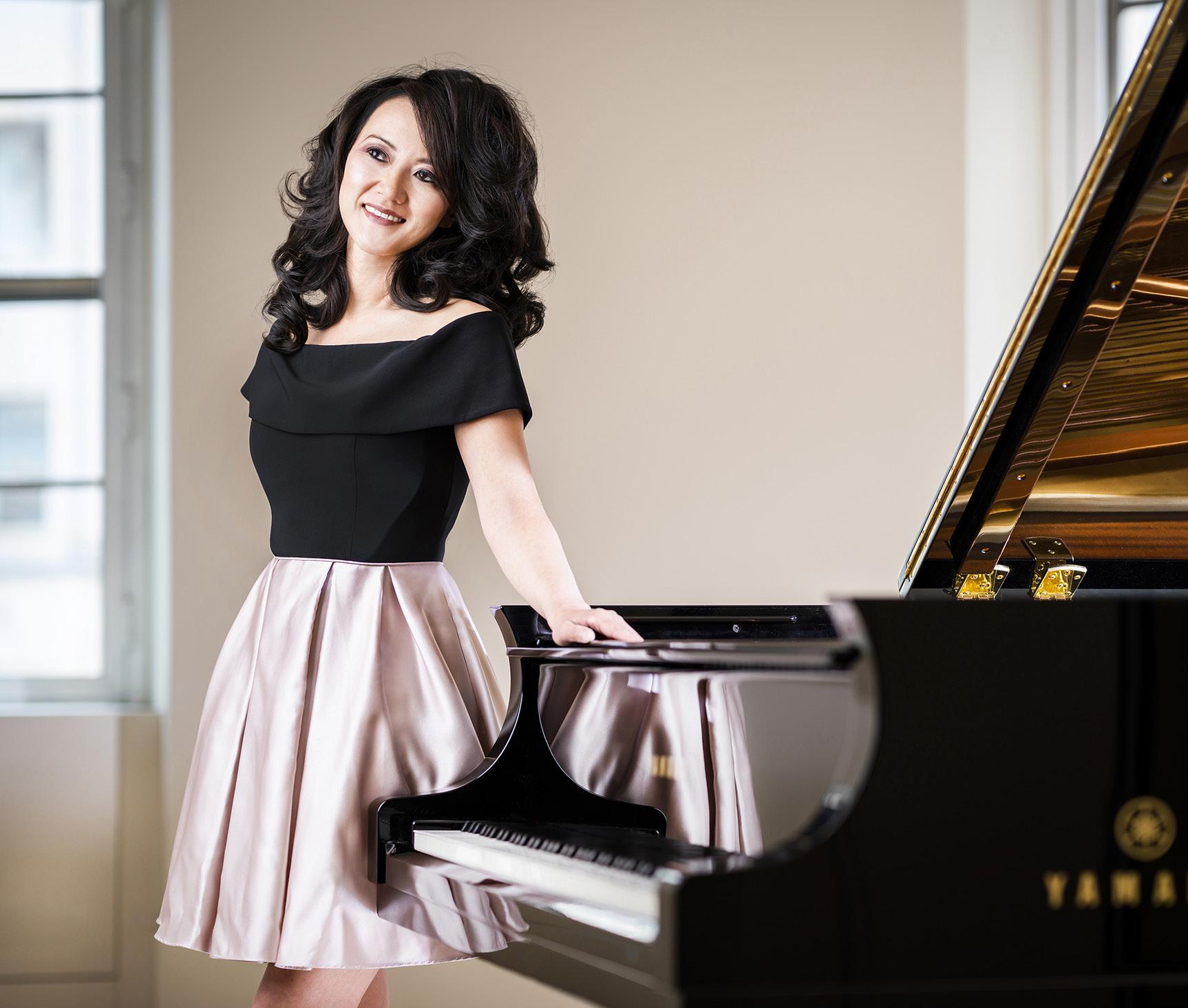
fit with the Latin flavor of the tune.
“My repertoire,” she continued, “is eclectic, and I’m always looking for something I want to play that inspires me, and it doesn’t always come from the world of jazz.” Another familiar tune on the album is Richie Havens’ “Freedom” (based on the traditional “Motherless Child”). “I was
so impressed with his performance at Woodstock,” she said, “when I watched the documentary. ‘Freedom’ was a song he improvised after having played for three hours. It inspired me so much. I loved his spirit and energy, and I felt this was an important song that I wanted to include on the album.”
AAJ’s McClenaghan thought Miwa
approached “Freedom” with “a McCoy Tyner-like muscularity, backed by the dense rhythmic backdrop from bassist Will Slater and drummer Scott Goulding. It is a powerhouse, all-things-possible sound, spiritual and temporal at the same time.”
Miwa was also busy with online performances during the pandemic. “We were part of the East Coast Jazz Festival on March 20,” she said. “Six major jazz clubs on the East Coast presented a combination of online live streamed and pre-recorded video performances. It featured 60 notable jazz artists. I was presented by a club I perform at yearly, Blues Alley in Washington DC. We pre-recorded a 75-minute video performance with my trio in the same studio where Songs of Joy was done. That same video was rebroadcast April 30 which was International Jazz Day and was presented by the Herbie Hancock Institute.”
10 MAY 2021 JERSEY JAZZ NJJS.ORG
PHOTO BY CHRIS LEE

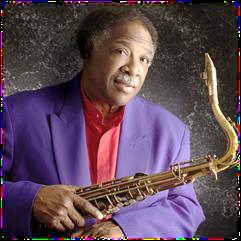

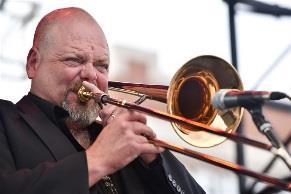
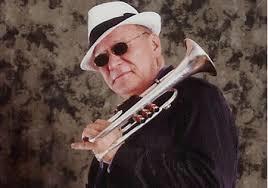

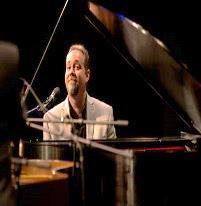
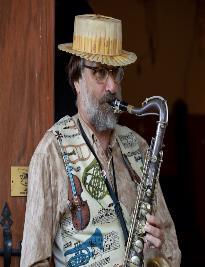
Are you a jazz fan and love to cruise?
If you are a fan of Swing, Dixieland, Classic Jazz, Chicago Jazz, Traditional Jazz, in fact just about any style which emerged during the first half of the 20th century, plan to attend JazzFest at Sea - presented in a private jazz club atmosphere limited to 25 0 guests! Our cruise will be departing roundtrip Port Canaveral (Orlando) to the Bahamas and Mexico on the MSC Divina for 7- nights of jazz and fun.
Take a look at what you get!
Private Performances Every Evening
Private Afternoon Performances on Sea Days and some Port Days
Mix & Mingle Open Bar Cocktail Party
Join our JazzFest Jammer sessions if you play an instrument or sing!
Ask about our Early Booking Onboard Credit!

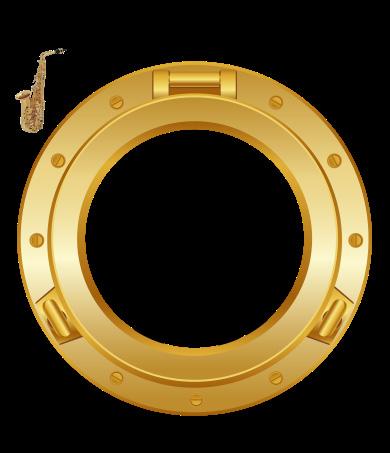
October 3 -10, 2021
Join us for the only jazz cruise sailing in 2021 as we are sure you need something to look forward to! Call us today or check out our website !
www.jazzfestatsea.com
(800) 654 -8090
We will be following all CDC and cruise line COVID guidelines that may be in place during our sailing!
Featuring
Allan Vaché – clarinet John Sheridan – piano
Houston Person – tenor sax Eddie Metz – drums
Warren Vaché – cornet Brian Holland – piano
Danny Tobias – trumpet Charlie Silva – bass
Paul Keller – bass Jim Lawlor – drums
John Allred – trombone Bob Draga – clarinet
Scott Robinson – tenor sax Ted Rosenthal – piano
Vocalists
Banu Gibson Yve Evans
In addition to our internationally acclaimed artists, we will once again be offering more than twenty hours of opportunity for our guests who are amateur musicians to jam in your own JazzFest Jammer sessions led by John Skillman and Mike Evans. Plus, if you would appreciate some instruction and critique during the jam sessions, feel free to ask .
Amazing Caribbean itinerary from Port Canaveral with ports that include an overnight at Ocean Cay Marine Reserve, Cozumel and Costa Maya !
Inside Stateroom only $9 99*
Oceanview Stateroo m only $1 099*
Balcony Stateroom only $ 129 9*
Aurea Balcony Stateroo m only $164 9*
Aurea Suites from $ 19 99*
Yacht Club Suites from $ 2499*
*Pricing is per person, cruise-only based on double occupancy and includes all taxes and fees. Must book with Cruise & Vacation Depot or approved agency to attend private performances. Deposit is $400 per person and is due at the time of cabin selection. Fares and performers subject to change. Please be advised the performance venue is non -smoking for all guests.
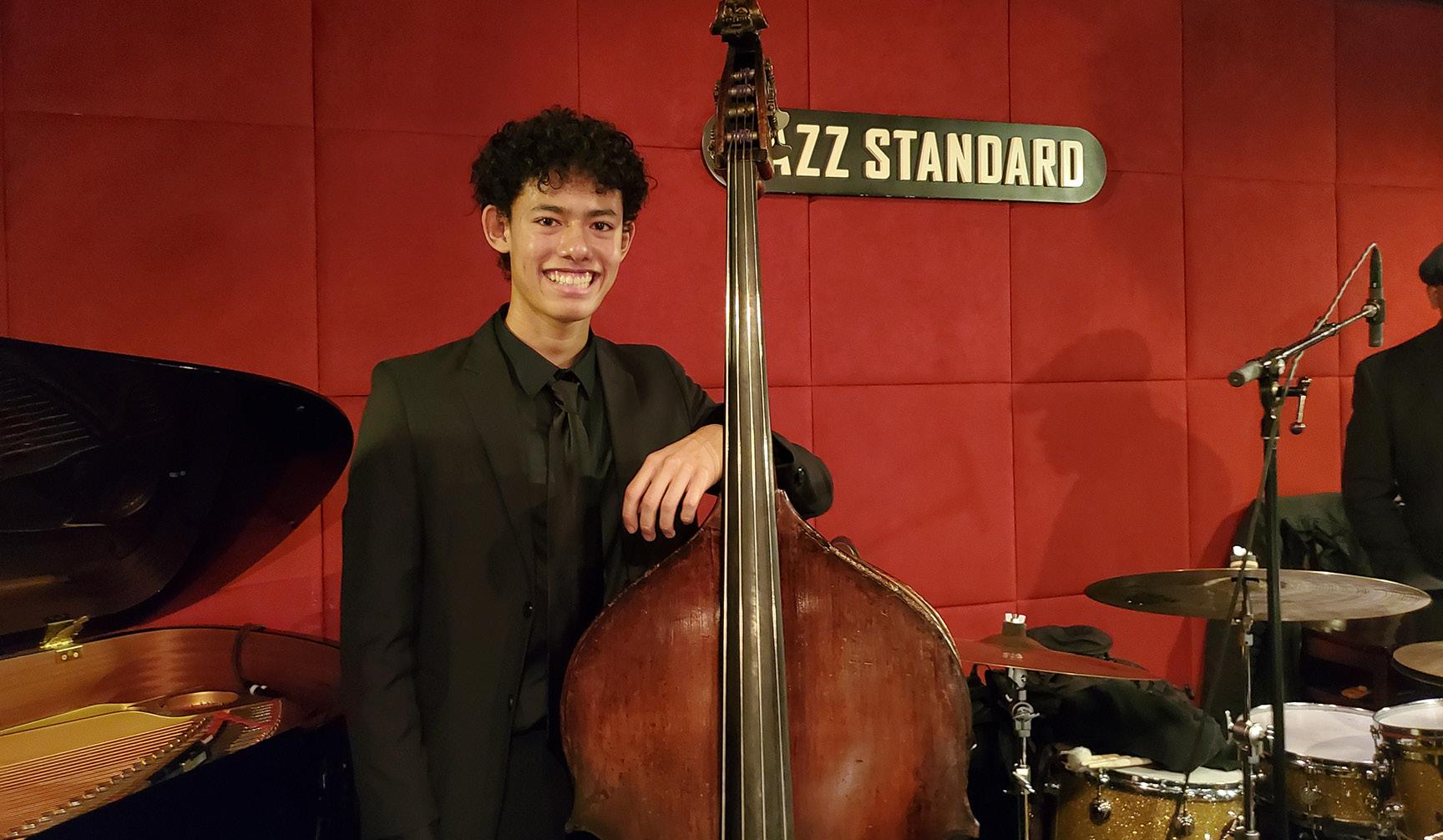
Carnegie Hall Youth Ensemble Will Have a New Jersey Cadence This Summer
“A Rare Opportunity to Play Jazz Music with the Best Young Musicians in the Country”
BY SANFORD JOSEPHSON
When young drummer Koleby Royston was a freshman at Piscataway High School, he went to see a performance of Carnegie Hall’s NYO Jazz Orchestra. “At that time,” he said, “I didn’t know that kids barely older than me could sound so good. From that moment on, I was really set to get into it. I tried out my freshman and sophomore years and got rejected.”
Royston is now a senior, and this year he was accepted into NYO, along with two other New Jersey high school students—bassist Ryoma Takenaga, a junior at the Academy for Information Technology in Scotch Plains, and trumpeter Ace Williams, a Maplewood resident and high school junior who is studying online.
For Takenaga, a resident of New Providence, playing with NYO is “a dream come true. All musicians have some kind of big goal they want to
12 MAY 2021 JERSEY JAZZ NJJS.ORG NYO JAZZ
Ryoma Takenaga with bass once played by Charles Mingus.
reach, and, for me, it was participating in NYO Jazz because it’s a rare opportunity to be in residence with and play jazz music with the best young musicians in the country, while at the same time, receiving music instruction from excellent jazz musicians and educators.” Williams is “honored” to be part of NYO and is “looking forward to being able to play with my peers as well as being under the tutelage of some amazing musicians.”
Carnegie Hall’s Weill Music Institute launched NYO Jazz in 2018. “It grew out of the National Youth Orchestra,” said Joanna Massey, CH Director, Learning and Engagement Programs. “Clive Gillinson (Executive and Artistic Director of Carnegie Hall) felt strongly from the beginning that, while it’s very important to have a youth orchestra, it’s equally important to have a jazz ensemble representing the best musicians from across the
country.” The Artistic Director from the beginning has been Sean Jones, who served as lead trumpeter for the Jazz at Lincoln Center Orchestra from 2004 to 2010 when Massey was JALC Associate Director, Education.
“I was lucky enough to be chosen Artistic Director from the get go due to my with relationship with Joanna Massey,” Jones said. “She was my connection to Carnegie Hall. We had great synergy.” Jones, Massey said, “was the ideal educator, artist, leader for this job. He has done an incredible job, setting a clear vision around his expectations as to who these kids are as people and how they can come together.”
Jones described the three New Jersey students accepted into this year’s program as “not just fantastic musicians. They’re fantastic people.” To be in the NYO Jazz program, he added, “you have to be an ambassa-

13 MAY 2021 JERSEY JAZZ NJJS.ORG
NYO JAZZ
Koleby Royston
NYO JAZZ
dor for the music and the country itself. Each student applicant has to do a video and a written essay about how music has affected them.”
The first two years of its existence, the NYO Jazz Orchestra toured—Europe in 2018 and Asia in 2019. Last year, because of the pandemic, the program was completely virtual, and this year there will be no touring, but the orchestra will make a recording. There are 26 members from 13 states. “We’ll begin about July 5,” Jones said, “and go to the end of the month. In essence, we’ll be in a bubble up at Suny Purchase. We rehearse pretty much sunup to sundown. We choose one or two composers a year to write a specific piece for us to play, and we play some pieces from the standard repertoire.” One of the composers this year is composer/arranger/bandleader Jihye Lee, a former vocalist who’s been praised for her
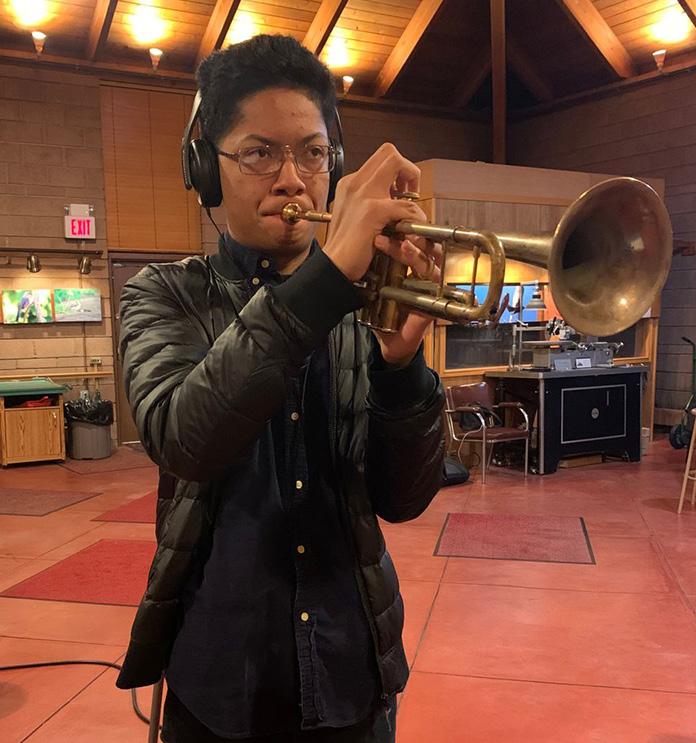
risk-taking and storytelling approach to large ensemble jazz. Among the faculty members are trombonist Wycliffe Gordon, bassist Mimi Jones, and saxophonist Eric von Kleist.
Williams and Royston grew up in musical families. Williams’ father, Willie Williams, is a saxophonist. Royston’s parents are drummer Rudy Royston and pianist Shamie Royston, and his aunt is alto saxo-
Ace Williams in the recording studio for Father and Son.
phonist Tia Fuller. “I grew up with my father’s influence,” Williams said, “working with him, having a chance to be around some of the masters of this music, and having the chance to work with some of them a little bit as well. Without my father, I would not be playing this music. I also got the chance to work with him and record with him on his new recording that he just released entitled Father and Son.”
Royston pointed out that, “A lot of people know my dad is a drummer. I’m really trying to develop my own sound. I don’t want to sound exactly like my dad. One thing that is very different is our approach to melodic soloing. I don’t really play a lot of notes.”
Takenaga’s jazz hero is bassist Christian McBride, whom he met about four years ago. “I am looking forward to playing jazz music every day for a whole month,” he said. “Music brings me joy, the kind of joy that I don’t feel from anything else. The fact that I will be in an environment where we are encouraged to play music every day sounds like paradise to me.”
Takenaga, Royston, and Williams have often jammed together in the past. Said Takenaga: “We were ecstatic when we heard all three of us got into NYO.” Takenaga also has been playing outdoors in Maplewood, weather permitting, in the Baker
14 MAY 2021 JERSEY JAZZ NJJS.ORG
NYO JAZZ
“ WE WANTED TO BE A GOOD CITIZEN TO
PROGRAMS
THAT EXISTED. ”
& High School Competition (Jersey Jazz, May/June 2020). When the pandemic started, Royston said, “I had an idea that I was going to come out of this pandemic burning. At first, it was hard to find motivation to practice, but I’ve really taken time to, not only get better at drums, but to come out more mature about how I’m going to go about this music.” In addition to the actual performing, Royston is enthusiastic about the opportunity at NYO Jazz to make personal connections. “It’s a chance to create a whole network of people I can play with and hang out with when I get older.” At press time, he was deciding between two colleges— Street Trio, consisting of himself, pianist Ben Collins-Siegel, and drummer Ben Schwartz. One of the highlights of last fall, he said, was the opportunity play in a live streaming concert from Brooklyn’s ShapeShifter Lab. “I was part of an opening jazz band for tenor saxophonist Ravi Coltrane, son of the late great John Coltrane,” he said, adding, “I not only opened for Ravi, but also played with him during the livestream concert, and that was a memorable experience.”
Manhattan School of Music and Johns Hopkins’ Peabody Institute (where Sean Jones is on the faculty).
Takenaga and Royston are members of the New Jersey Youth Symphony Jazz Orchestra and won Outstanding Soloist Awards in February 2020 at the Charles Mingus Festival
Williams studied at the New Jersey Performing Arts Center’s Jazz for Teens program “under the tutelage of (alto saxophonist) Mark Gross, (trumpeter) Valery Ponomarev, (saxophonist) Wayne Escoffery, and (trombonist) Earl McIntyre.” His trumpet hero is Lee Morgan. “When I heard Lee Morgan in the third grade, I said, ‘Ok, I want to play the trumpet now, and his influence still is strong in my playing until this day. His soul, feeling, and sound all resonate with me.”
When NYO Jazz was founded, Massey pointed out, “We had the chal-
lenge of being new and totally unknown. There were a number of fantastic programs, locally and nationally. We wanted to be a good citizen to programs that existed. We work very hard to make sure the ensemble represents the whole country—geographic, ethnic, and gender diversity. We also do everything we can to showcase the fact that so many young women of this age are playing jazz music.” One example of those young women is trumpeter Summer Camargo, a Juilliard student who played in the 2018 and 2019 NYO Jazz orchestras. She is featured in the Rising Star article on page 29.
Speaking about his students, Jones said, “I try not to convince them to go into music. I try to give them the most professional experience possible. The best thing they get from this is reality. If they’re not cutting the music, we let them know. But, we also don’t over celebrate.”
15 MAY 2021 JERSEY JAZZ NJJS.ORG
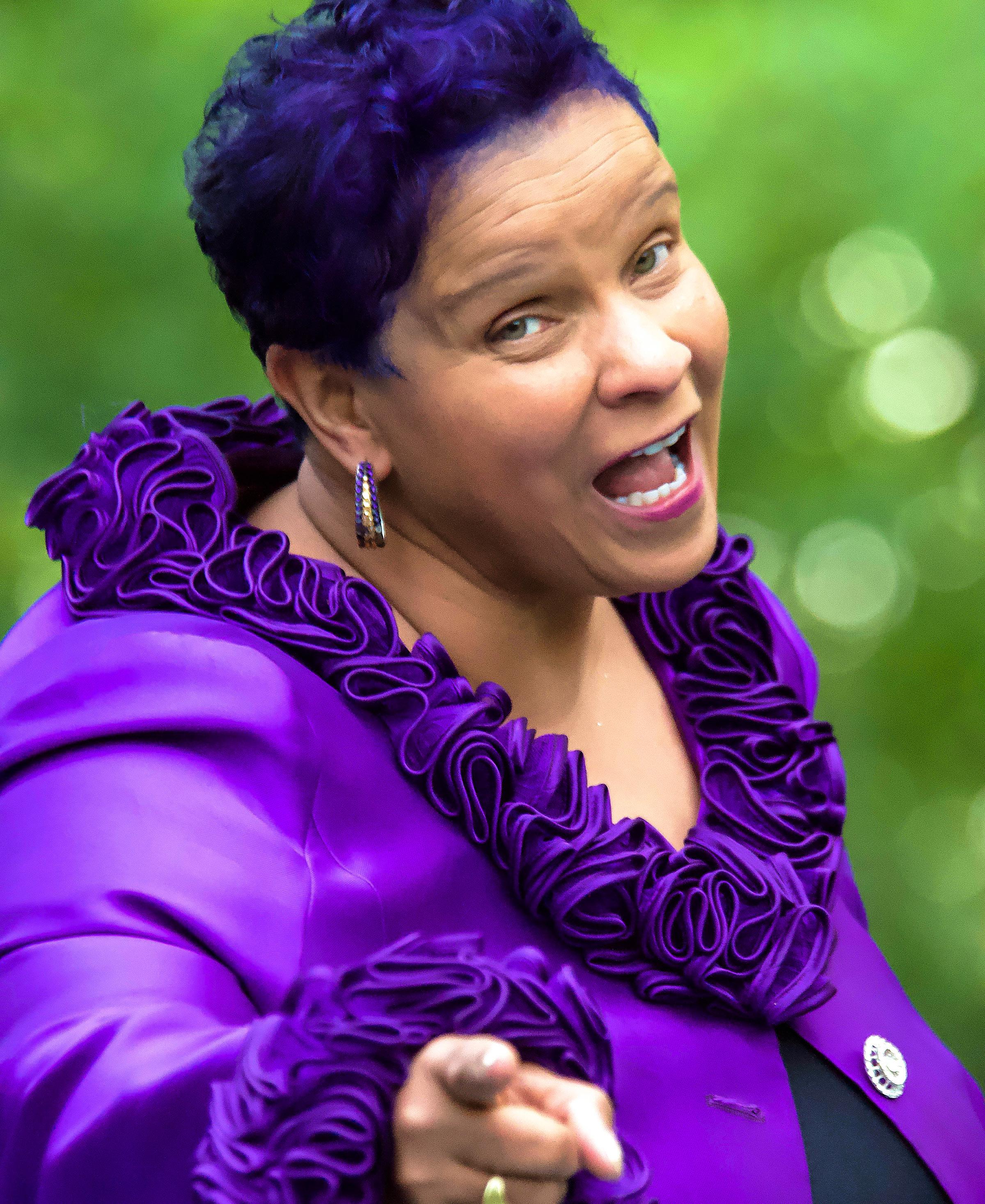
6 NORMANDY HEIGHTS ROAD / MORRISTOWN, NEW JERSEY The ANTOINETTE MONTAGUE EXPERIENCE THURSDAY / MAY 27, 2021 / 7:00 PM Rain Date: Friday, May 28, 7:00 pm JAZZ on the BACK DECK Antoinette Montague VOCALS / Danny Mixon PIANO / Melissa Slocum BASS McClenty Hunter DRUMS / AC Lincoln TAP DANCE … WILL BRING GREAT SINGING, MUSIC, DANCE and MORE Tickets » $50 for an 8’ x 8’ block/accommodates up to 2 patrons. Patrons are welcome to arrive at 5:30 pm to set up and enjoy the evening sun. Swing dancers welcome to dance within their own blocks. To purchase tickets by phone, call the box office at 973-971-3706. CLICK HERE TO PURCHASE TICKETS ONLINE
A Jersey Jazz Interview with Boris Kozlov
BY SCHAEN FOX
Afew years ago, bassist Boris Kozlov and pianist Dave Kikoski— bandmates in Opus 5 and the Charles Mingus Big Band— recorded a duo album that never got released. Then, due to serendipitous, pandemic-related circumstances, the album, Sure Thing, was released this past February on the HighNote label. At press time, it was at Number 33 on the Jazz Week charts, after peaking at Number 22. Kozlov, who was born in Moscow, moved to the United States in 1991 when he was in his 20s. “I just have to express that with all this craziness,” he said, “I feel extremely lucky having chances to play.”
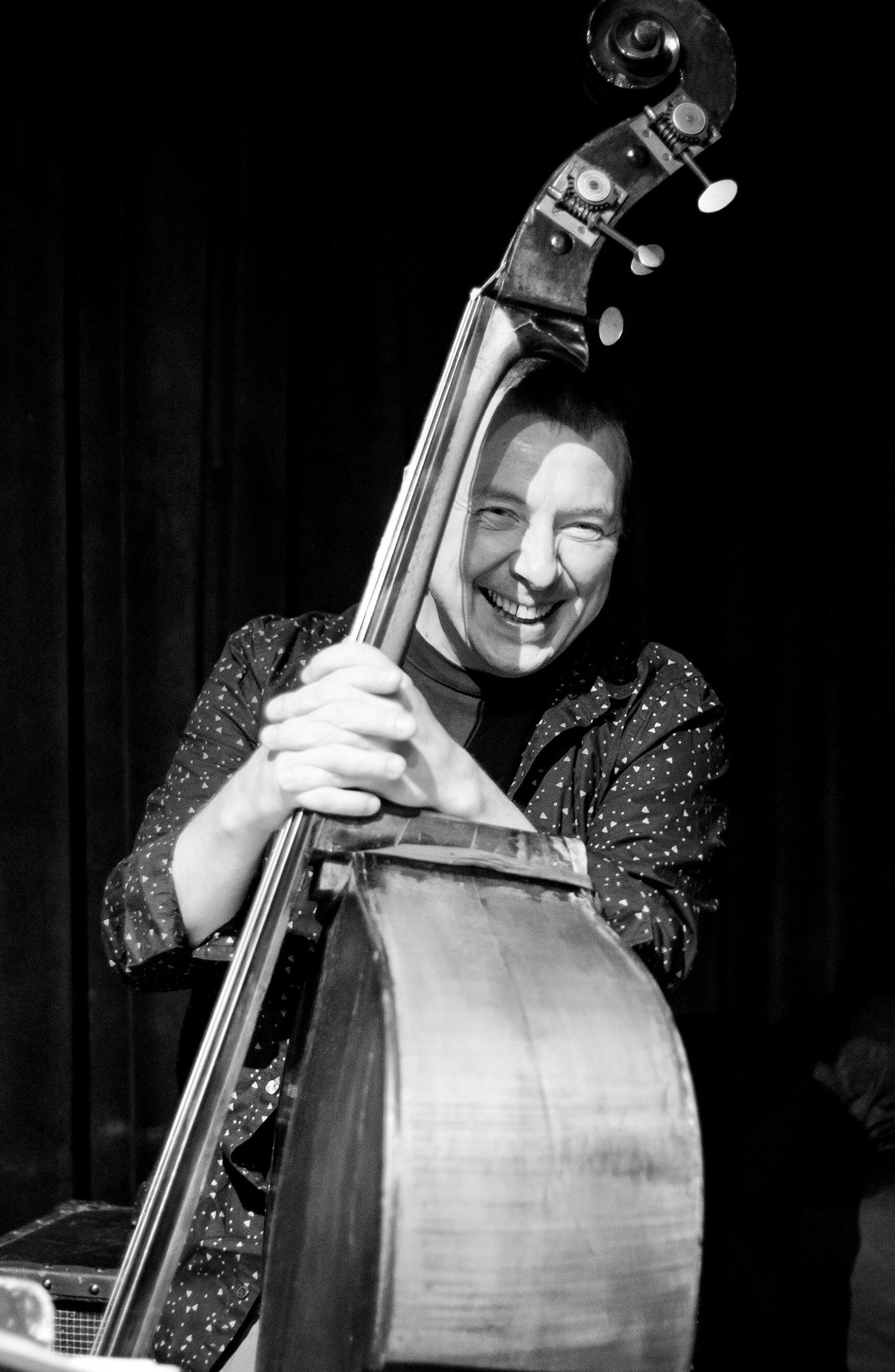
17 MAY 2021 JERSEY JAZZ NJJS.ORG TALKING JAZZ
PHOTO BY SARA PETTINELLA
JJ How did ‘Sure Thing’ finally get released?
BK If not for the pandemic, it would never have seen the light of day, or at least, you would not see it now. We recorded it a few years back. Dave and I played together in Opus 5 and the Mingus Big Band. At some point, we said, “Why don’t we make a duo recording?” We just kept talking about it, and our good friend, Mike Sim, heard that and jumped in, “Why don’t you guys come over to my house, and record there?” He had all the proper microphones, a great grand piano, great space, and he could record bass and piano well. And we did.
After doing so, we were thinking, “What would we do with it as far as putting it out?” Right around that time, Dave signed up with HighNote for a quintet recording that obligated him not to put anything out under his name for three years. So, he suggested
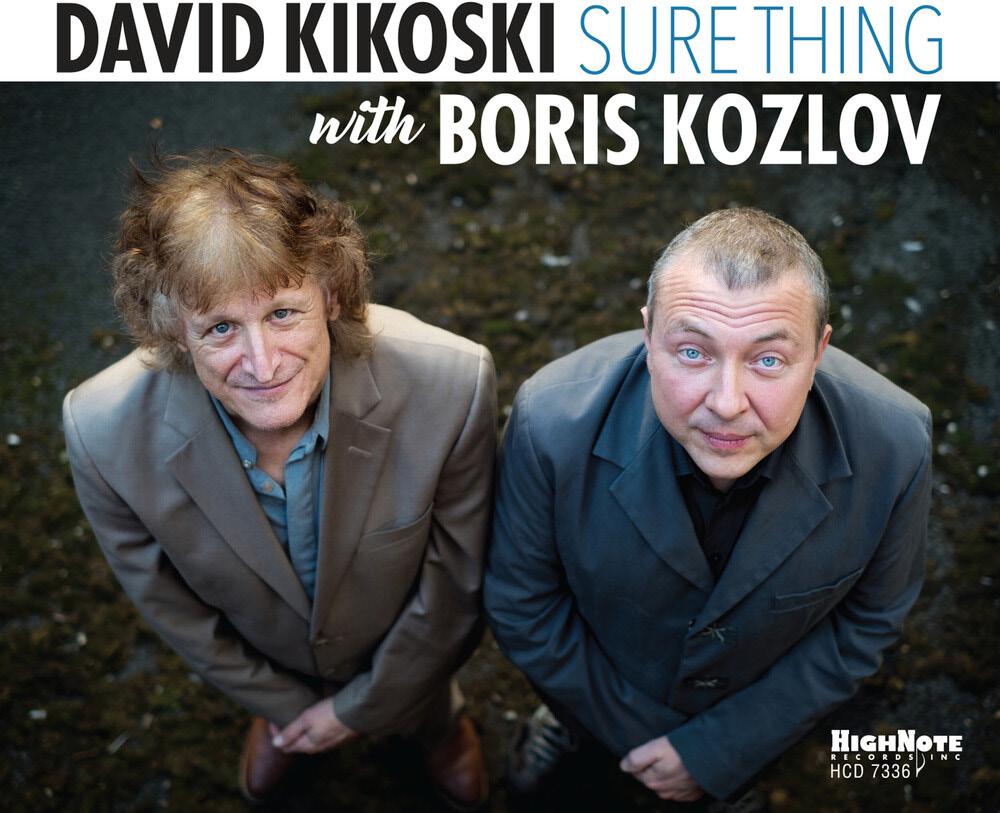

Then, the pandemic hit, and I guess High Note was not doing anything. So, Dave suggested to them, “Would you like to listen to the duo record?” They did, and they loved it. So as far as editing, they had to do just minimal stuff. And over the fall, we took pictures. And Barney, the owner of the company, he put it out in February.
JJ You made another recent recording as part of a group called Out to Dinner. Tell us about that.
BK Out to Dinner is basically Marc Free’s baby. Marc is the owner and producer of everything that happens on Posi-Tone. Four years back, he threw together a band. His main idea with it was the famous record of Eric Dolphy’s, Out to Lunch (Blue Note:
1964) with Tony Williams and Richard Davis and Bobby Hutcherson. Besides the vibraphone, there is no other chordal instrument on that. That was the basic sound idea, and it worked out fine. There’s a lot of work for the vibraphone player, but it sounds really interesting, like there’s a harmonic structure in there. Because of the vibes, there’s a lot of openness, too.
Throughout these four years, on a few recordings, Mark suggested some people, or he would just put on some people, but the core of it would be (vibraphonist) Behn Gillece and myself. And he would say, “Okay, guys, I consider this to be your band.” And it kind of took, because Behn and I conceptualize like, “What do we put on this record?” It wasn’t just Mark’s baby anymore. It really became our band, and a feature of the label as well. Not that there is any kind of formula on this, but we found some putting it out under my name. I said, “It would be strange because it’s all of your music or your arrangements; there’s not a tune of mine on this.”
18 MAY 2021 JERSEY JAZZ NJJS.ORG
TALKING JAZZ
TALKING JAZZ
stuff that just works from record to record. And this putting together by the label owner of the band, became a productive, and artful relationship between Behn Gillece and myself. (The other musicians in Out to Dinner’s February 2021 album, Play On, are trumpeter Giveton Gelin, tenor saxophonist Nicole Glover, drummer Donald Edwards, and alto saxophonist Patrick Cornielius. All About Jazz’s Kyle Simpler wrote that the group’s “tight-knit complexity and polyrhythmic approach echoes certain elements of Dolphy’s music without sounding derivative.”).
JJ What attracted you to jazz?
BK I was first into rock and disco. When I was growing up, ABBA was huge in the Soviet Union. There was this band, Eruption, a British band, made of Jamaican musicians. They played like a reggae disco. They were
“
I WANTED TO PLAY UPRIGHT BECAUSE I HEARD ANATOLY SOBOLEV PLAY IT. ”
tening to Leningrad Dixieland on the record with the banjo on two and four, and I was thinking, “Man, this Dixieland music is as hip as Eruption.”.
And I remember having almost a physical pleasure listening to them. They were brilliant musicians. I did hear jazz. I remember liking the Dixieland groove. My father had an LP of this band called Leningrad Dixieland. They played the typical Dixie music, some early jazz standards, and some Soviet songs, just with a rhythm. I remember the physical pleasure of the same nature lis-
And then I started playing in the rock band in school and wanting to become a musician and basically entering college being a rock-head. But most of my peers and teachers were jazz players, even though the college department was called the contemporary variety music department. So, it was only natural that I started checking out the jazz. But when I was in the first year, there was not much to check out. The teachers hadn’t super popular in Russia, in part because the government label Melodia licensed their stuff from EMI in Britain and made millions of copies that we could actually buy in stores.
done the copying of their LPs for me yet. So, I went to the college library commercial music department file. The way you did it, you got a card and brought it to the librarian who gave you the reel-to-reel of that file. I found the drawer and, on few entries, it said, “Jazz/rock do not give to the first year [students].” Of course, that’s not what I wanted to hear. I bribed the librarian with sandwiches and coffee from the cafeteria downstairs. The only way to copy from reelto-reel to my cassette machine was to plug headphones into a reel-to-reel machine, take the cheap microphone
19 MAY 2021 JERSEY JAZZ NJJS.ORG
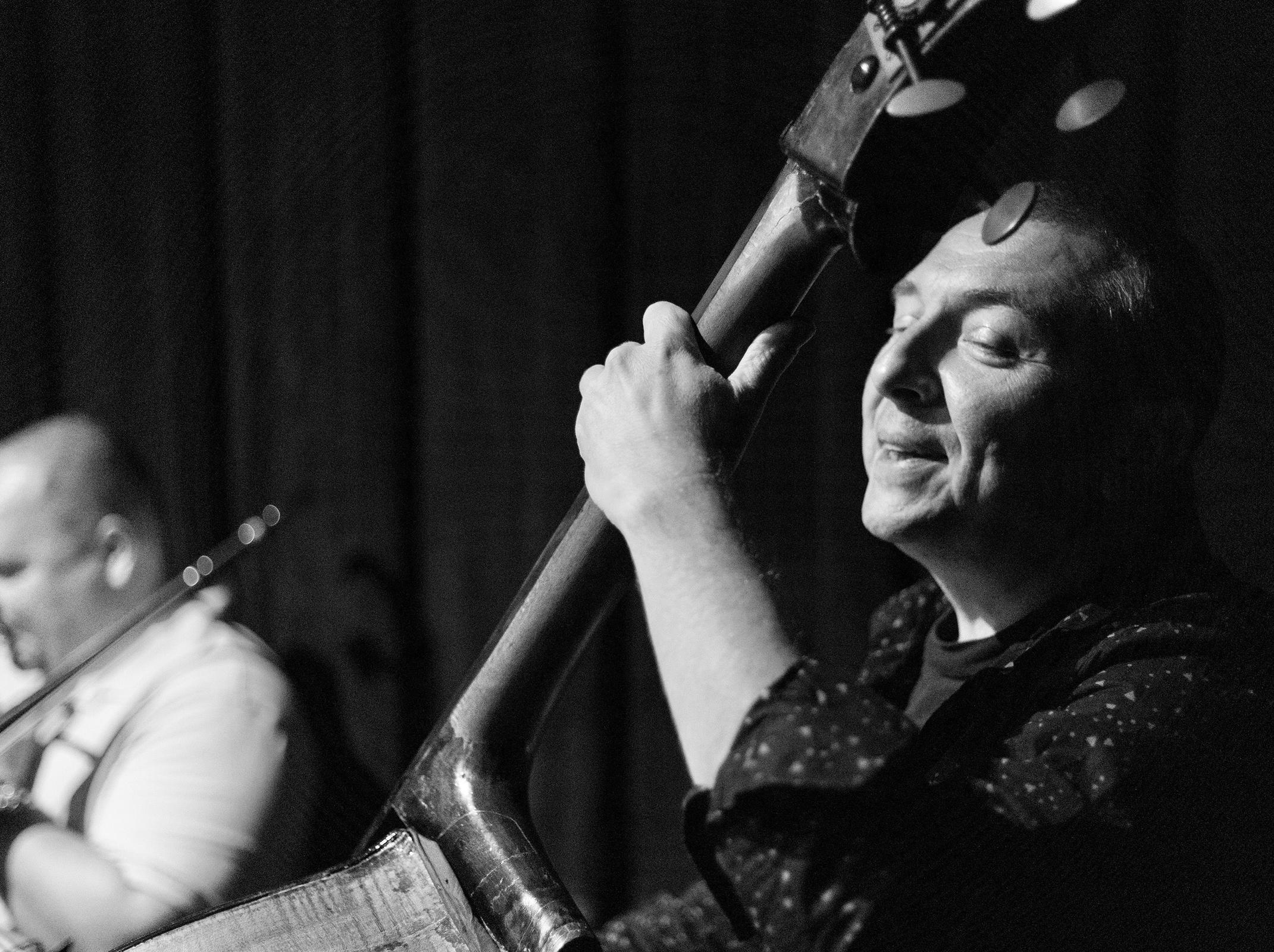
that came with the cassette player and put it into the headphones. That’s how I copied Miles’The Man with the Horn, Billy Cobham’s A Funky Thide of Sings, and Mahavishnu’s Birds of Fire. By the way, I had no idea who played on these records or anything, as it was not filed. It was only later on in the States that I found out.
I not only took extreme liking to that style, but it also made me extremely curious. I wanted to hear what Miles Davis did before, and I learned that Miles played with Charlie Parker, and boom, boom, boom. Then I wanted to play upright, because I heard [renowned Russian bassist] Anatoly Sobolev play it. Also,
I was good enough on electric bass that they put me in a top ensemble class. I played very well, but I didn’t know harmony well. I couldn’t construct baselines well, and, basically, I played electric bass with a pick. I quickly had to figure out how the harmony works and how the baseline is constructed and all that. So, there was another nudge in the direction of starting to learn upright and starting to really learn the history of jazz.
JJ How did you get to study with Anatoly Sobolev?
BK I wasn’t in his class. In college, at that time, nobody played upright, everything was electric bass; and he was an upright player, teaching electric bass. I did hear him play an upright at concerts, and I just commented to him how amazing it was, and how I wish I could play. He started teaching me to play upright bass in secret after all the
classes were over. He would stay and spend his own time for free in such a manner that my electric teacher wouldn’t know about it, so there would be no hard feelings. So that’s how an incredible and enthusiastic guy he was.
In the later years, when American musicians started going to Russia, a lot of people played with him. I spoke to Lew Tabackin and Benny Golson, and they had extremely high praises for him. I think Ben even called him the Paul Chambers of Europe. He was classically trained, but completely self-taught. He was from the generation of people who would record Voice of America programs secretly, and then transcribe the basslines from the reel-to-reel machine.
JJ So, obviously, he lived long enough to see your success.
BK He did see me become Musical Director of the Mingus band and
20 MAY 2021 JERSEY JAZZ NJJS.ORG
JAZZ PHOTO BY SARA PETTINELLA
TALKING
make like two recordings, and he saw me play with Buddy DiFranco. He also saw Terry Gibbs give me my first touring situation in the States. He compiled the first book that other colleges in the former Soviet Union would use, with explanation of how the bassline constructed and examples of different things in transcription, a bass book that nobody had ever done in Russia. It’s [still] in print. On page two, it says in his dedication, “To my student, Boris.” I saw that, and, of course, it’s extremely touching.
Anatoly and couple of other teachers spent all their time and money with music and students. When he had an occasional foreign trip, he would go and spend all his money buying LPs, double tape machines and double cassette tape machines. And then he would constantly record music for students. That was the source of my information because we couldn’t buy stuff in the store. My majority of tapes came from him, and from another professor, a saxophone teacher who became my ensemble
class teacher. He was the same way, men without family spending majority of time with students and music and copying tapes for students. That’s how I first heard Wayne Shorter, Art Blakey, Miles, and George Benson.
coming out of Rostov now are also Armenian. You might see some like Samvel Sarkisyan who’s also Armenian ethnically, but grew up in Rostov. He’s a drummer for Joe Locke.
“
THE VERY FIRST BAND I HEARD ON AMERICAN SOIL ... THE JON FADDIS QUARTET.
”
JJ At the first USSR competition for jazz soloists in 1990, you won the grand prize. How many musicians actually took part? BK I don’t recall the details now, but maybe 20 or 30 people. It wasn’t broken down by instruments like here. It was more like who’s the best soloist no matter what instrument you play? I think maybe there were five or six people for each instrument, and it was in the town of Rostov on the Don, which is famous for its specialized public jazz school created in the ‘80s. That school was started by an enthusiast, an Armenian guy. Half of the musicians
JJ You made three trips to the US before you moved here.
Please tell us about them.
BK Well, the first one was to Texas, and that was magic. First, we flew in a huge Russian airliner, but it couldn’t fly further than 4,000 miles or something. It flew to New York but had to make stops in Ireland and Newfoundland. I’d never flown that far in my life. When we got to Kennedy, we had to take two more flights, one to Dallas on American Airlines and one to Corpus Christi. We were sponsored by a bunch of local people, Embassy Suites and Whataburger, which is one of the burger chains. They just packed the
21 MAY 2021 JERSEY JAZZ NJJS.ORG
TALKING JAZZ
“ I REMEMBER HEARING KENNY WHEELER AND OREGON AT THE BLUE NOTE.. ”
fridge at Embassy Suites with Whataburgers. Because the festival was more like student exchange, one Armenian oil guy organized corporate gigs for us at his lounge downtown and at his house just so we could make some money. It was really sweet. The first night there, they brought us to the festival, and the very first band I heard was brilliant. It was the Jon Faddis Quartet with Tony Sherr on bass, Billy Drummond, with whom I became friends and play a lot with, on drums, and Renee Rosnes on piano. That’s the first band I heard on American soil.
The second, and most important time we came here, was the end of 1990, beginning of ‘91. I was part of Melodia label’s studio band. The amount of work for the band was dwindling, because the government was getting poorer and wasn’t ordering recordings as before. The band was looking for work, because the government salary was really small. One restaurateur decided to open a restaurant in Mineola, Long Island. He didn’t want Russian music. He wanted a classy restaurant with a cheap but really good, classy swing dance band.

NJJS.ORG 22 MAY 2021 JERSEY JAZZ
JAZZ grunincenter.org Grunin Center Box Office Hours Mon.-Fri. 10:00am-5:00pm 732-255-0500 College Drive P Toms River, NJ Contact the Box Office two weeks prior to any show to arrange for disability and accessibility services. The Grunin Center and Ocean County College Support the Arts THE
WILL GO
TALKING
SHOW
ON
TALKING JAZZ
He auditioned bands in Moscow with the proposition to go and play at the newly opened restaurant for a few months. He heard our band in our studio and right there he was like, “Oh, yeah, we’re taking you.” And New Year of 1991, we were flying to New York.
At first, we played five or six nights a week. They weren’t exactly booming in popularity, so they started asking us to come maybe two or three times a week, and some of the days just a trio, then only the weekends. We stayed there for five months.
During that long stay, I was really into going to the clubs. The LIRR train station was right there, and I remember hearing Kenny Wheeler and Oregon at the Blue Note; and I remember hearing and talking to Joe Henderson and Rufus Reid three times at Fat Tuesday’s. So, I have like good memories of that time and had the desire to come and try here.
I also finally bought my first electric bass, since I didn’t have one. And during that time, I made connections with Fodera guitars, who wound up helping me tremendously over the years until the present. I mean, I couldn’t afford to pay, and they never asked.
The third time was coming back for the same festival, but the band was different. The band was mostly students of the Academy, plus our saxophone, and ensembles class teacher, Alexander Oseichuk. We decided to include him to strengthen the band. So, officially, we were a student band, but technically, our top voice was a professor. And at that time, I decided to stay, and that made our professor a little angry. He was afraid that he would get some crap from the authorities in Russia that not all members of the band came back, but he never did. At that point nobody cared.
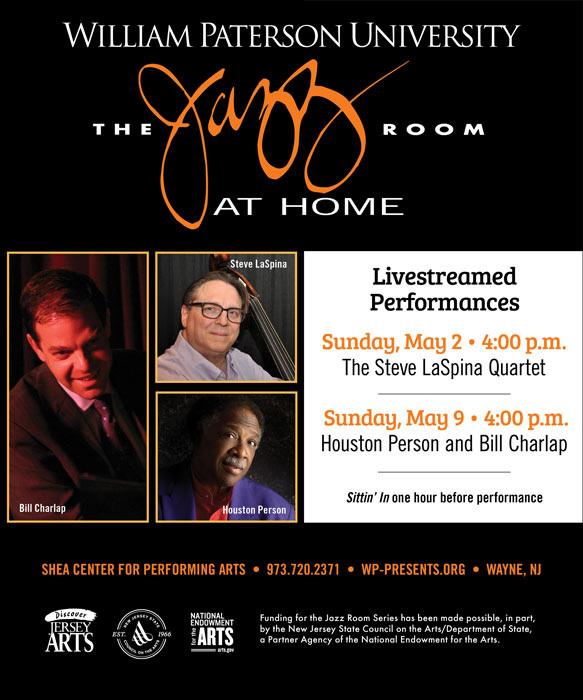
NJJS.ORG 23 MAY 2021 JERSEY JAZZ
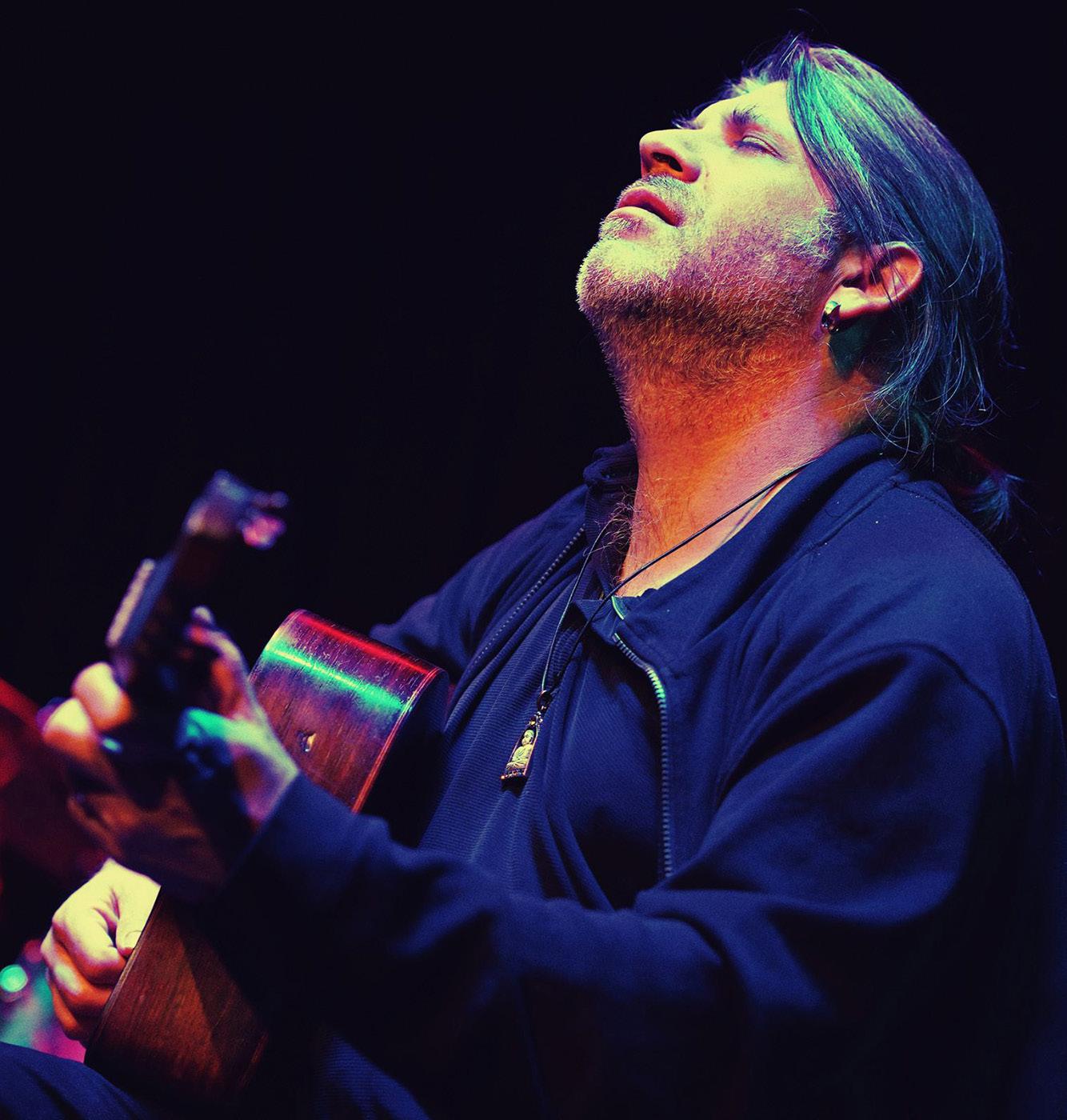
Paris-Born Guitarist Stephane Wrembel Has Emerged as Authentic Reinhardt Interpreter
His Style Also Draws from Other Influences Such as Fusion, Classical, and Flamenco
BY JAY SWEET
Sinti (Northern Europe Gypsy) jazz guitarist Django Reinhardt was the first great jazz soloist on the guitar and the first international jazz artist to gain notoriety in America. Along with his musical partner, violinist Stephane Grappelli, Reinhardt created a unique performance style that is often referred to as “gypsy jazz.” With instrumentation that only incorporated rhythm guitars, violin, and acoustic string bass, Reinhardt came to fame through his engagement at the Hot Club of France (19341939) and through recordings and appearances with legendary artists such as Coleman Hawkins, Benny Carter, Dizzy Gillespie, and Duke Ellington. Amazingly, Reinhardt achieved all this despite his left hand being badly burned in a caravan fire, leaving him only full mobility in two fingers. After finding international fame, he eventually returned to a European Gypsy lifestyle and passed away in 1953 at only 43.
Nearly 70 years after Reinhardt’s
24 MAY 2021 JERSEY JAZZ NJJS.ORG THE DJANGO LEGACY
BY CASEY RYAN
PHOTO
death, there remains a community of musicians dedicated to preserving his music and style. Of these individuals, Maplewood, NJ, resident, and Paris-born guitar virtuoso Stephane Wrembel has emerged as one of the finest and most authentic Reinhardt interpreters. Much of Wrembel’s authenticity comes from his desire not only to understand Reinhardt’s music but his lifestyle. To make a stronger spiritual connection with Reinhardt and his music, Wrembel immersed himself in the Sinti culture by visiting French countryside campsites, participating in informal jam sessions, and performing at tra-
ditional wedding and family parties. These experiences shaped not only Wrembel’s playing but also his compositional style, which draws upon his travels and vast experiences.
After graduating from Berklee College of Music in 2003, he relocated to New York City and became active in the New York music scene, where he was performing with his own band, releasing two albums: Gypsy Rumble , featuring mandolinist David Grisman, (Amoeba Records:2008) and Barbes-Brooklyn (CDBY: 2008). In 2003, Wrembel created the annual Django a Gogo Festival, where he and others
perform, discuss, and teach Reinhardt’s music and guitar style. This year’s Django A Gogo Festival will be held from June 3-5 at The Woodland in Maplewood and June 6 at the Drom in New York City. Wrembel’s talents did not go unnoticed as he was asked to frequently appear or perform with other virtuosos such as mandolinists Grisman and Sam Bush; guitarists Mark O’Connor, Al Di Meola, Stochelo Rosenberg, and Raphaël Faÿs; multi-instrumentalist Hans Zimmer; and bassist/vocalist Esperanza Spalding. He has even headlined some of the world’s
“ A GUY LIKE DJANGO IS A GENIUS OF MUSIC, A GREAT COMPOSER, A GREAT IMPROVISER. ”
most prestigious venues, including Lincoln Center, Carnegie Hall, and The Lyon Opera House in France.
Beginning around 2008, Woody Allen began to take an interest in Wrembel, and his music was featured in the film Vicky Cristina Barcelona. Wrembel’s most famous composition, “Bistro Fada,” then served as the central theme to the Oscar-winning film, Midnight in Paris. He is also the composer of the score for Rifkin’s Festival, Allen’s most recent release.
While Reinhardt’s influence can certainly be heard in Wrembel’s playing and composing, he is not just a Django clone. Although he is against putting labels on music, Wrembel’s writing style certainly borrows from various other influences, including jazz fusion, classical, world music, flamenco, and progressive rock. When not creating and performing his works, Wrembel finds ways to
25 MAY 2021 JERSEY JAZZ NJJS.ORG
THE DJANGO LEGACY
preserve Reinhardt’s legacy. Through the six-part album series The Django Experiment (Arte Boreal Records), Wrembel often features lesser-known compositions by Reinhardt as well as other composers. One of Wrembel’s most ambitious projects was his 2019 release Django L’Impressionniste, Django the impressionist (See DJANGO AND DEBUSSY, Jersey Jazz, January/February 2020).
In support of the release of a book of his transcriptions from the compositions found on Django L’Impressionniste, gigs.live premiered a video of Wrembel performing the 17 Django tracks in their entirety on Thursday, April 22. I recently had the opportunity to interview Wrembel. Here are some highlights from that conversation. Tell me about your new book of transcriptions, Django L’Impressionniste?
A guy like Django is a genius of music, a great composer, a great improviser. It is hard to say how much of his music is prepared and how much is improvised. A lot of the things that he plays, you can tell that they are things that he played before. He played at home, he found a good idea, and then it’s in the corner of his mind. Maybe it’s prepared. For the transcriptions, I tried to capture the right notes and the right chord voicings. I proposed a set of voicings and fingerings that seem coherent to me, that are the ones I use to perform, but due to the nature of the guitar (which allows the same thing to be played in so many different ways), there is room for exploration. Talk to me about Django, the composer, and musician?
Django knew all aspects of music, from orchestration to improvisation
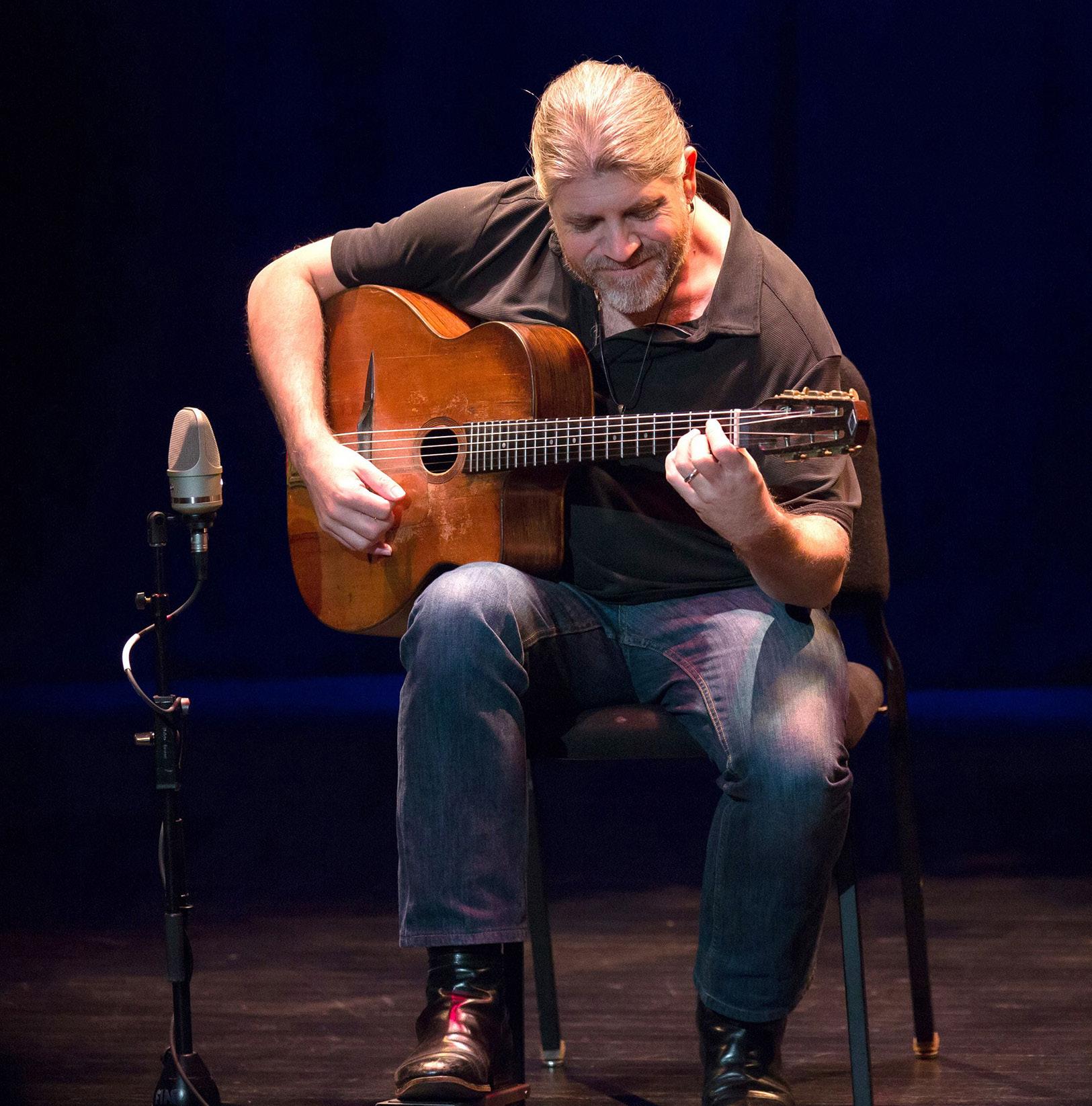
26 MAY 2021 JERSEY JAZZ NJJS.ORG
THE DJANGO LEGACY PHOTO BY BILL FARRINGTON
THE DJANGO LEGACY
or composition. In reality, for the music itself, there is no difference between composition and improvisation; it’s all the same thing. Django’s nomadic upbringing and education were more oriented toward improvisation. If he grew up in a more bourgeois home and had learned how to write down music, he probably would have written down 40 symphonies like Mozart or orchestrated pieces like Debussy or Ravel. Instead, he left us with the most incredible body of recordings of improvised guitar works one could have dreamed of. To learn Django’s style, you spent some time at French “Gypsy” camps. Can you talk about that experience?
When I first started to learn Django, it was the early ‘90s. There was no support to learn from: No books, barely any recordings, no Inter -
“
I DON’T THINK IN TERMS OF GENRE. I LISTEN TO MUSIC BASED ON WHAT I LIKE. ”
net of course ... There were just gypsies playing it for themselves. And even worse, Selmer-style guitars (gypsy-style guitars) were extremely hard to find! You could not find anyone to play with. It was complicated. But that was also the excitement, the feeling of embarking in a great mysterious quest Laurent Hestin, my guitar teacher at the time, was a good friend of Babik Reinhardt (Django’s son). He knew a bit of Django’s music, but that was enough for a start. He is one of the greatest guitar masters
in the world. I have rarely seen someone with such control of the instrument! Anyway, he showed me “Minor Swing,” then I bought a Django record, and then I went to the Django Reinhardt festival in Samois-sur-Seine (a charming small village where Django lived and is buried) . It was all within a few weeks. I fell in love with Django completely and right away.
I remember being at the festival and it felt like a revelation. I had never witnessed the guitar being played like that. There was poet -
ry and a truth contained within it that was undeniable. I remember thinking, “Why is this not being played everywhere, and why is everyone not listening to it?”
Now I faced a problem: where to learn the tradition? Luckily, I stumbled upon an announcement in a guitar magazine of a Russian mandolin player in Paris who offered Django style guitar lessons. In reality, he knew only a little bit of Django’s music, but that was enough to get crucial details. For example, he showed me chords like Am6 and that
27 MAY 2021 JERSEY JAZZ NJJS.ORG
THE DJANGO LEGACY
literally blew my mind then, “Wow! this how you play that chord!” He just showed me little things like that. Then I met Emmanuel Kassimo , who was studying with legendary Django guitar master Serge Krief. Shortly after I started studying with him. Then I studied with Moreno and Angelo Debarre. It was a chain of events like that, little by little.
Emmanuel and I ended up playing with Tifrere Ziegler, whose family is related to Django’s wife. They lived on a gypsy camp in Sannois, north of Paris, and we used to spend our time there playing hours and hours of guitar nonstop. This is where I crafted my technique, endurance, and playing style. It was amazing. Not only the music but the culture.
I notice you add lots of various styles into your music like progressive rock, jazz fusion, folk
forms, classical music, and yet you have studied so much Django music. Is it hard for Django’s influence not to creep into everything you do musically?
I don’t think like that. I don’t think in terms of genre. I listen to music based on what I like. Sometimes it’s a rock song, sometimes it’s classical, sometimes it’s jazz, sometimes it comes from the Middle East, from Zimbabwe. Sometimes I listen to something to study it. It’s a different frame of mind. I might listen to a Mozart symphony for example. Maybe it’s a symphony I don’t really fully enjoy or something I wouldn’t just sit down and listen to just for the pleasure of listening. Perhaps it’s not my taste, but I can go beyond my personal taste to study because I am a musician. Sometimes I listen to music to study and observe, sometimes I listen to
music to fill my soul, to score my day. It depends on which zone I am in at a certain moment. Sometimes a musician, sometimes a listener …
Tell me about how Woody Allen came to take an interest in your music?
Woody Allen just loved my music. My friend, [multi-instrumentalist] Jared Engel, had a friend working with him on the movie Vicki Cristina Barcelona , and he placed my then latest album release ( Gypsy Rumble ). Woody really loved the album and ended up placing my composition “Big Brother” as a score for the love scenes. Later on, he asked me to compose a theme for Midnight in Paris (“Bistro Fada”). I also composed a song and played in a scene for Magic in the Moonlight , but they cut the scene, so it will remain forever just a memory.
My last work with Woody Allen is Rifkin’s Festival. He asked me to be the composer for the entire score .
What is the future of jazz and Django music?
Jazz is alive in New Orleans. That does not die. You go to New Orleans and you learn jazz, and it is transmitted from father to son. There you can learn the real tradition of jazz! Then you can go to France and learn about Django. It’s still there. But in the end, there is no genre, it doesn’t exist. We have to remove this concept from our minds. There is harmony, rhythm, technique, everything else is a great mystery. Compose whatever you want, whatever you feel is a reflection of you. Like the inscription on the Apollo temple in Adelphi said: “Know yourself, and you will know the cosmos and the gods.”
28 MAY 2021 JERSEY JAZZ NJJS.ORG
Pianist Tyler Henderson and Trumpeter Summer Camargo
Juilliard Students Have Discovered a ‘Great Musical Connection’
BY SANFORD JOSEPHSON
Growing up in Oneonta, NY, Tyler Henderson “noodled around for five years on a piano that a church donated to my family. I learned to play older rock songs by ear—stuff from Chicago and the Beatles. Then, in seventh grade, I heard the Vince Guaraldi Charlie Brown Christmas Album. I was really intrigued. I had never heard music like that before. Then I discovered Bill Evans. He became my obses-
sion.” When Henderson was entering ninth grade, his family moved to Houston, and he attended Houston’s High School for the Performing Arts.
Summer Camargo started playing trumpet in the fifth grade at Calvary Christian Academy in Hollywood, FL. “In sixth grade,” she recalled, “My private instructor, Ral Estevenz, told me I had the potential to make it to Juilliard. I didn’t even know what Juilliard was. I was really into clas-
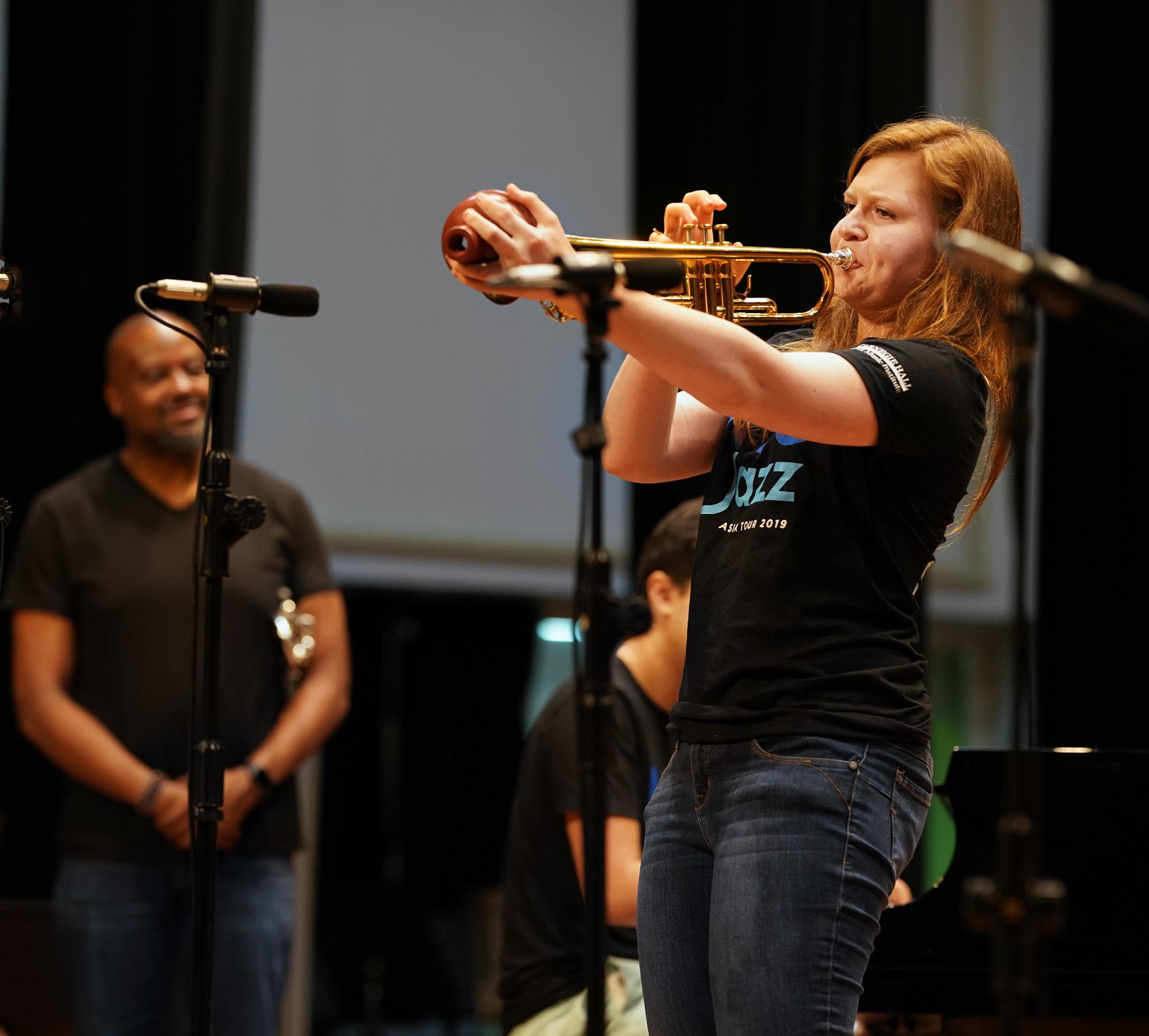
29 MAY 2021 JERSEY JAZZ NJJS.ORG
RISING STARS
PHOTO BY TODD ROSENBERG
Summer Camargo with Sean Jones in Taiwan during NYO 2019 Asia tour.
RISING STARS
sical music at the time, but the high school started a jazz band.” While still in middle school, Camargo auditioned for the high school jazz band, and “slowly I started to fall in love with jazz.” Estevenz encouraged her to audition for the all-state jazz band, and “when I made that, it changed my life.” She was recruited by Dillard High School, a Fort Lauderdale-based public high school with a prestigious performing arts program, and switched there for ninth grade.”
Camargo and Henderson are now second year Jazz Studies students at The Juilliard School in New York. During his high school years, Henderson was part of a student all-star sextet selected by the Thelonius Monk Institute of Jazz’s Peer-to-Peer jazz education program. He and five other students went on tours of educational “informances” at public high schools in the Dakotas, accompanied by pro-

fessional musicians such as tenor saxophonist/flutist Don Braden, trumpeter Sean Jones, and trombonist Delfeayo Marsalis. Calling the tours “a great experience,” Henderson said, “We did a bunch of concerts, showing the students how to build blues and chords and such. We played for the students and also performed at a club.”
Braden remembers Henderson as “a very talented and skilled young jazz pianist. He played beautifully throughout our tour, prepared well, was a solid accompanist and consistently played melodic, focused, yet relaxed solos.”
When Camargo was attending Dillard, she was part of the school’s
jazz band in 2017 that finished third in Jazz at Lincoln Center’s Essentially Ellington competition. “I was so excited,” she recalled. “When those three bands (the finalists) performed again, we were all backstage at Rose Hall, and Wynton [Marsalis] was talking to my band director. Wynton had been a huge hero of mine since middle school.”
The following year at the Essentially Ellington competition, Camargo became the first female trumpet player to be named the Festival’s best soloist. She also won the songwriting award for best original composition and arrangement. Before she performed her composition, “Leapfroggin’” with members of the JALC Orchestra, Marsalis introduced her, saying, “She is spectacular in her playing and her presence. What can I say about her? It just gives me so much hope and feeling.”
30 MAY 2021 JERSEY JAZZ NJJS.ORG
Tyler Henderson and Wynton Marsalis playing with Jazz Houston in 2018.
“ BOTH STUDENTS ARE PLANNING TO STAY IN NEW YORK OVER THE SUMMER. ”
Henderson had an unexpected opportunity to play with Marsalis in Houston in May 2018. “One of the members of Jazz at Lincoln Center— trombonist Vincent Gardner—had relocated to Houston,” Henderson recalled. “He created a band called Jazz Houston, and I had been playing with that band for two years. Wynton came to Houston and was going to be a guest artist with Jazz Houston for a big band concert. I was called as the pianist for the concert. I was so excited. I rehearsed with the band for the whole week. I only saw him at the sound check right before the show. We did another show downtown at a library. He was really nice to me and said, ‘You’re an intelligent player.”
There is a long list of pianists whom Henderson considers major influences, ranging from legends such as Earl ‘Fatha’ Hines and Bud Powell to lesser known keyboardists such as Chris Anderson (“Herbie Hancock’s teacher”) and Clare Fischer (“genius of harmonic movement”). As for Camargo and trumpeters, “At first, Miles Davis and Wynton were the only two I knew. Around eighth grade, I discovered Clifford Brown.” In her junior year, it was Dizzy Gillespie and Terell Stafford. Another inspiration was Sean Jones, who directs Carnegie Hall’s National Youth Jazz Orchestra. Camargo was a member of NYO in 2018 and 2019 (See NYO JAZZ: Developing Future Stars, page 12).

NJJS.ORG 31 APRIL • 2021 JERSEY JAZZ
RISING STARS
In addition to being JALC Managing Director and Artistic Director, Marsalis is Director of Juilliard Jazz, and Henderson and Camargo feel fortunate to be part of the program. “What he does for the program is amazing,” said Henderson. Added Camargo: “He has changed jazz education.”
This school year, Henderson and Camargo had 75 per cent of their classes online. “We did have two classes in person—small combo and big band,” Henderson explained. “Everyone wore masks, and we spaced out eight to 13 feet apart.” Julliard, added Camargo, “did something unusual. They did an academic block that ended in April. Then, they extended the school year and added a performance block—just performance. Now that the weather’s nicer, we can play in Central Park and outside the Juilliard building.”
Both students are planning to
stay in New York over the summer. Henderson hopes to play in some jam sessions. Camargo is putting a recording together, hoping to finish it just before school starts in the fall. She’s also writing a big band chart for the University of North Carolina at Greensboro Miles Davis Jazz Studies program. That’s due in August.
Camargo and Henderson played together at the New Jersey Jazz Society’s Virtual Social in March, and they also had a gig together recently at Dizzy’s Club’s Late Night Sessions, performing music of Louis Armstrong’s Hot Five and Hot Seven bands. When Henderson and Camargo played virtually for NJJS, Camargo realized that, “I really enjoyed talking to the audience. I hope to tour one day with my own big band and my own combo.” Added Henderson: “I love playing with Summer. I feel like we have a great musical connection.”




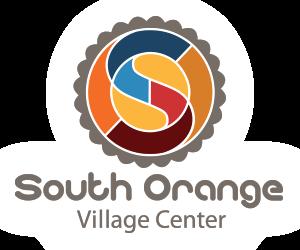

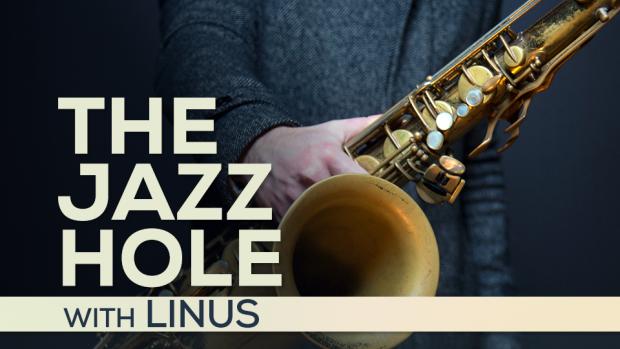
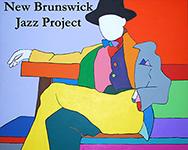
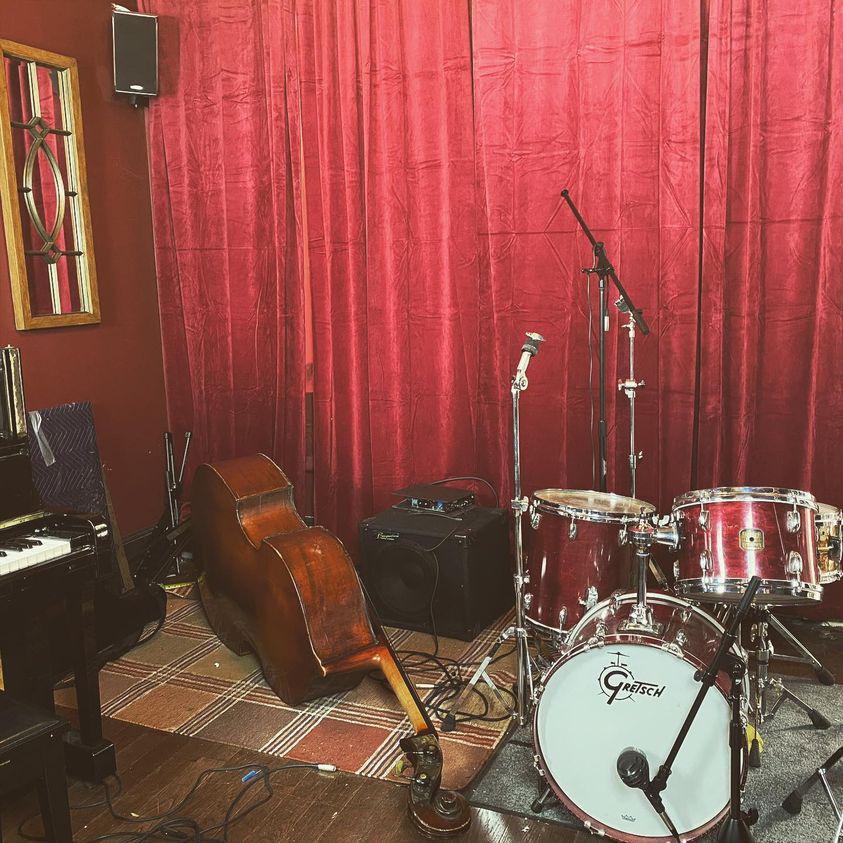
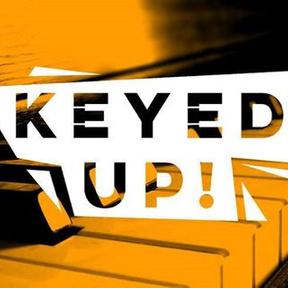
NJJS.ORG 32 APRIL • 2021 JERSEY JAZZ
RISING STARS A WEALTH OF NEW MUSIC AND EMERGING TALENT IN AND AROUND NORTH JERSEY ! Safely distanced / big heated tent Tavern on George / 361 George St New Brunswick THURSDAYS & SUNDAYS Bar Bayeux Facebook live stream Wed 7:30 NEW MUSIC PODCAST Monday nights Open jams in Jersey City Sundays 3-5 April & May - Info: gregoryburrusaroundtown MOORE'S PLACE Elks Ideal Lodge Englewood NJ Jazz returning Mon May 31! nbjp.org More info: James Pansulla / JazzEducation@njjs.org
BY DAN MORGENSTERN
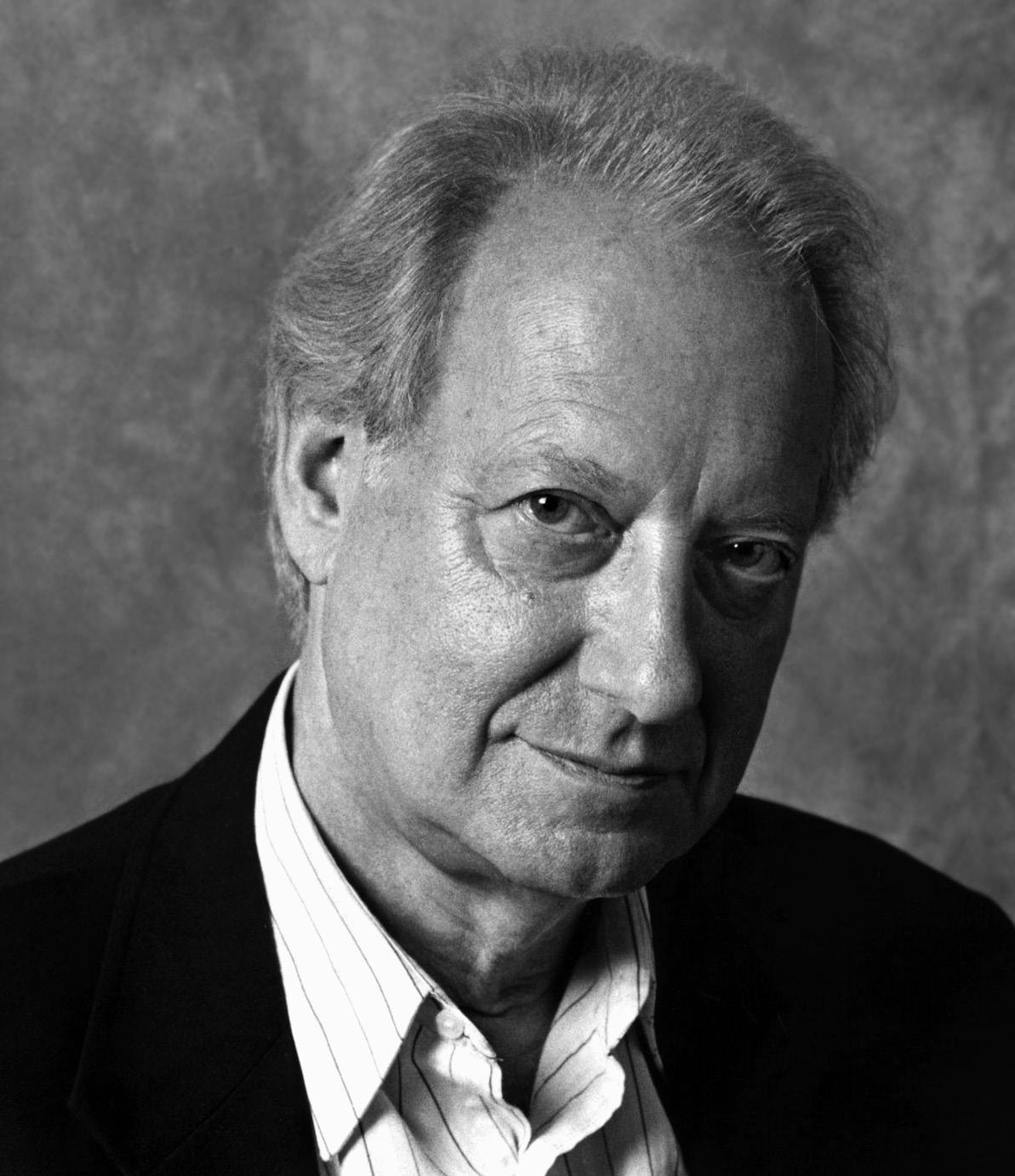
I’ve said it before and alas, if my luck lasts, will have to say it again: Losing friends is the worst thing about growing very old.
Hard on the heels of my dear Jack Bradley, who got a well deserved big obit with several of his great photos in The New York Times—the Bible of obituaries, as was celebrated a few years ago by the film Obits. It was well reviewed but not a box office success. Many think it’s a morbid
subject. But take it from me, a more than half a century-long Times reader who first turns to the obit pages—it’s not. These are records of human achievement, much of it new to most (at least in detail), from which all can learn much about the good (and bad) we humans are capable of. Don’t you turn to our BIG BAND IN THE SKY among the first things in Jersey Jazz? In this issue, you will find details about the life of Bob Porter, who was one of my longest and dearest friends. I can’t recall when we first met but am pretty certain it was either at a club or concert or festival many moons ago. Bob’s great love and labor was what we call ‘Soul Jazz’, and that was the title of his fine book, self-published, (Alas, it should have found a better outlet, but jazz, unless it is infused with currently popular political and social issues, is still a specialized field. Billie and Ma up there will surely get my meaning).

Bob was inspired by the sounds and spirit of the tenor-and-organ sounds special to Black clubs and socials and found ways to record, write about, and play on the air the music he loved and understood so well. I was aware of and liked these sounds but Bob introduced me to much I didn’t know, including such treasures as organist Don Patterson and the young tenor man, Houston Person. When I became editor of DownBeat, I made
Bob a columnist on this topic; his column was called “Soul Stirrings”. He was an excellent writer, as can be gleaned not only from his book and many liner notes, but also his essay “The Blues in Jazz,” in The Oxford Companion to Jazz. He knew his history, so was well equipped to delve into the past with his own label specializing in unissued, newly discovered good stuff, fittingly named Phoenix.
Bob and I lifted many a mug together, memorably on annual get togethers at the Collectors Bashes in the Garden State and many other venues. Bob was a supporter of live music from way back. It was Bob who introduced me to great characters like Teddy Reig and Boris Rose at memorable lunches in Chinatown. And to his wife and partner in jazz, Linda. I’ll miss Bob more than I already do when this plague recedes and social life returns. And when one of those questions that only he could answer arises ...
33 MAY 2021 JERSEY JAZZ NJJS.ORG
DAN’S DEN
Remembering Andy Fusco
BY WALT WEISKOPF
Andy Fusco was a big man—big in stature, big in talent, and, most of all, big of heart. I met Andy when I saw the Buddy Rich band in Weedsport, NY, in 1980. At the time, I had the idea that I would stalk the band and make myself available where there was an opening in the saxophone section. At the time, this seemed unattainable, but I was young, naïve, bold, and persistent.
When Andy stood and played an immediate, flawless alto solo on “Wind Machine” at breakneck tempo, I knew I would remember that moment always. I had not heard anything like it, except on records I listened to great players such as Charlies Parker,
Sonny Stitt, and Cannonball Adderley.
During intermission, I marched up and introduced myself to Andy. A year later, after moving to Brooklyn, meeting and playing with other members of the saxophone section and at various jazz sessions, I got my chance to join the band. I could hardly believe it, as I was very inexperienced, but Andy mentored me patiently. It was not smooth sailing, but somehow I hung on. Eventually, Andy began to look at me like a peer, instead of just the rookie kid I had been on my first tour, a twomonth run in California and Japan.
Andy was a great musician and a great talent, but, paradoxically, he was insecure about both these things and liked to be reassured with much regularity that he was loved. Lawrence Feldman, one of the best saxophone players and doublers in our business, wrote me a condolence email when he heard of Andy’s death.
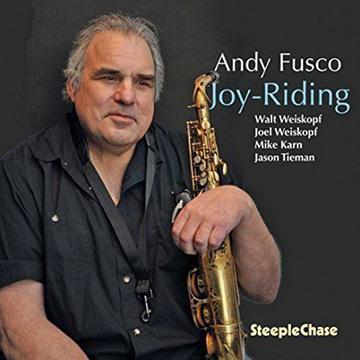
Andy Fusco died April 5, 2021, in Brooklyn at the age of 73, after a yearlong battle with the long-term impact of Covid-19. In addition to playing with Fusco in the Buddy Rich band, tenor saxophonist Walt Weiskopf appeared on Fusco’s 2017 Steeplechase album, Joy-Riding. Reviewing the album, London Jazz News wrote that, “Andy’s rich and liquid sound is imbued with a snakelike bendyness in his phrasing that is unique and endearingly warm and comforting to boot.”
Fusco is survived by his wife, Judy Nathan; his daughters, Isabella Fusco and Erin Means; granddaughters, Josephine and Madeline; mother, Josephine; and sister, Linda Tortorici.
He reminded me of something I said to him about Andy years ago. Apparently, I said to Lawrence that, “Every so often I listen to Andy to remind myself what jazz really is.” Andy always said the best compliment was the kind that comes back to you second or third-hand through someone else. I wish he could have heard this. When Andy played the saxophone, you could feel it as well as hear it. As much as I told him these things over the years, I’m not sure he ever believed it. But that’s the mark of a great artist. A real artist is never satisfied for long with an accompaniment. A real artist can recognize a job well done but always wants and looks forward to the next opportunity to do better. Andy was a real artist and a real friend.
34 MAY 2021 JERSEY JAZZ NJJS.ORG BIG BAND IN THE SKY
Bob Porter
He Invented the Term, “Soul Jazz” to Describe the Mixing of Jazz and Rhythm & Blues
Jim Eigo, Owner of Jazz Promo Services, goes way back with WBGO’s Bob Porter, who died April 10 in Northvale, NJ, at the age of 80. Posting on Facebook, shortly after Porter’s death, Eigo recalled
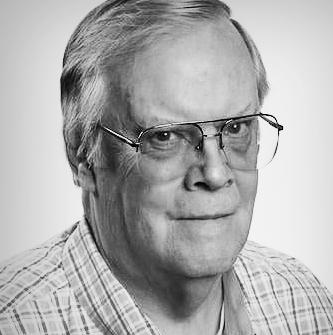
when Porter had a record store, Jazz Etc., on Bergenline Avenue in Hudson County. “Not only did Bob possess an encyclopedic knowledge of jazz and blues,” Eigo said, “he had a million anecdotes about the ‘business’, musicians, and the many jazz characters who crossed his path.”
Tenor saxophonist Houston Person was friends with Bob Porter since the late 1960s. Person told WBGO’s Nate Chinen that Porter “loved our music, and he especially loved connecting jazz with the Black community. He was devoted to keeping alive that R&B link to jazz, though he was primarily a jazz producer.”
In addition to producing several of Person’s albums, Porter produced
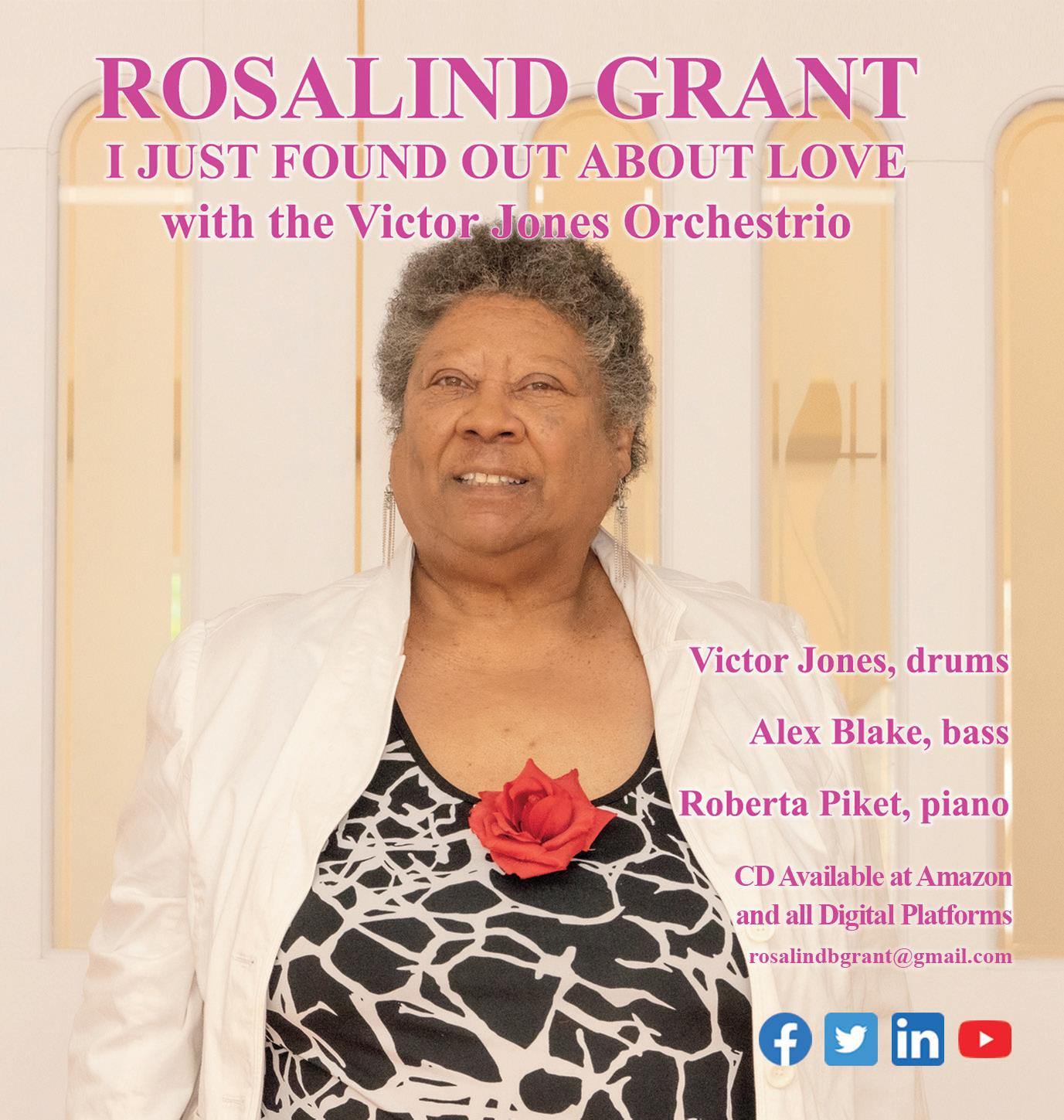
NJJS.ORG 35 APRIL • 2021 JERSEY JAZZ
IN THE SKY
BIG BAND
BIG BAND IN THE SKY “ PORTER RECEIVED FIVE GRAMMY NOMINATIONS AND WON TWICE. ”
albums by many other jazz artists including saxophonists Gene Ammons and Hank Crawford, guitarist Pat Martino and organists Jimmy McGriff and Charles Earland. He coined the term “soul jazz” to describe the mixing of jazz and rhythm & blues.
Porter’s “Portraits in Blue” began as a syndicated radio show in 1981. He joined WBGO in 1979, hosting a twohour Wednesday afternoon show. Recently, he recalled that, “Jazz was going through one of its down times, and I would play records that were outof-print. The show was called ‘Rare But Well Done’. I was serving only as a volunteer. The first song I played was Count Basie and Joe Williams’ ‘Every
Day I Have the Blues’. My theme song was Houston Person’s ‘Goodness’.”
Born in Wellesley, MA, on June 20, 1940, Porter grew up listening to popular blues-oriented jazz artists such as pianist Horace Silver and alto saxophonist Lou Donaldson. The first album he produced was organist Charles Kynard’s Professor Soul (Prestige: 1968). That was quickly followed by two other Prestige albums—Harold Mabern’s Rakin’ and Scrapin’ in 1968 and Person’s Soul Dance! in 1969.
Porter received five Grammy nominations and won twice: In 1979 for Best Liner Notes for Charlie ParkerThe Complete Savoy Sessions (He was also its reissue producer); and in 1986
for Best Historical Album, for Atlantic Rhythm and Blues 1947-1974 Vols. 1-7. He also received several other awards: W.C. Handy Award (aka Blues Music Award); Nick Bishop Award for Outstanding Service from the New Jersey Jazz Society; Blues Heaven Award from Willie Dixon’s Blues Heaven Foundation; Community Service Award from Bergen County Chapter, NAACP; Marian McPartland-Willis Conover Award for Excellence in Broadcasting from the Jazz Journalists Association; Induction into the Blues Foundation Hall of Fame.
Steve Williams, WBGO CEO, said Porter was “blessed with a pair of ‘golden ears’ ... The seminal role he played in the success and longevity of WBGO is undeniable and will never be forgotten.”
Cause of death, according to his wife, Linda, was complications due to esophageal cancer.
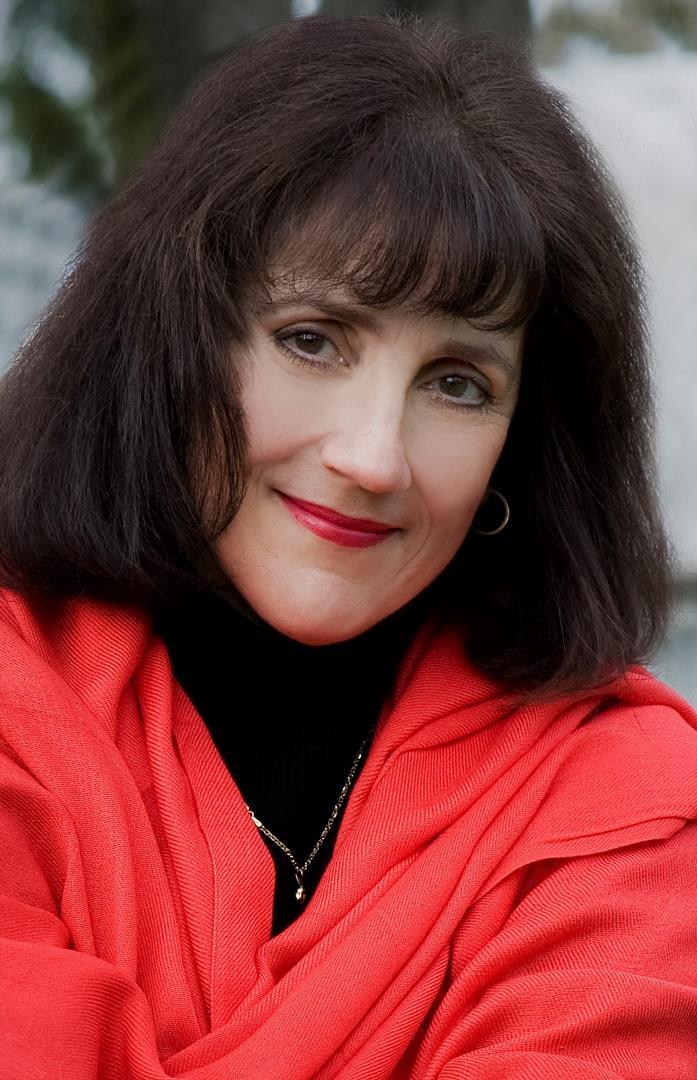


May 9th, Mother’s Day, at the Tides Hotel, Asbury Park. 7:00-10:00.
Charlie Ruggirello – guitar
Mike Carino – bass
Behn Gillece – vibes
No cover, great food, and a darn good pour.
Call for reservations and patron limits: 732-897-7744
NJJS.ORG 36 APRIL • 2021 JERSEY JAZZ
OTHER VIEWS
BY JOE LANG
Recently, Impex Records released a remastered Limited Edition 70th Anniversary, version of the Frank Sinatra Columbia album Sing and Dance with Frank Sinatra (Impex – 60360. The original album had eight tracks, and was the first concept album by Sinatra that emphasized his swinging side. The arrangements were by George Siravo, but the story behind these tracks is a complex one, related in the wonderfully written and informative notes provided by Chuck Granata in the accompanying booklet. On the LP version, Side 1 contains the eight songs from the original album, “Lover,” “It’s Only a Paper Moon,” My Blue Heaven,” “It All Depends on You,” “You Do Something to Me,” “Should I,” “The Continental”, and “When You’re Smiling.” Side 2 has bonus tracks, material not on the original album, consisting of two tracks with
the Harry James Orchestra, “Farewell, Farewell to Love” and “Deep Night; the orchestra take, false starts and alternate vocal take of “You Do Something to Me;” an alternate vocal take of “American Beauty Rose;” and session material, plus an alternate vocal take on “You Do Something to Me.” The CD version also includes an alternate vocal take on “It’s Only a Paper Moon.” This is an important entry in the Sinatra catalog, and this release captures the music wonderfully. impexrecords.com
Reedman Evan Arntzen has been a strong presence on the New York City scene since arriving from Vancouver in 2014. Countermelody (Dot Time – 9100) finds Arntzen playing clarinet, soprano sax, and tenor sax in the company of trombonist Charlie Halloran, trumpeters Jon-Erik Kellso and Mike Davis,
guitarist/banjoist Arnt Arntzen, pianist Dalton Ridenhour, bassist Tal Ronen,and drummer Mark McLean for an enthusiastic trip to the world of New Orleans jazz. There are 15 tracks of joyful music, sure to lift your spirits. Adding to the joy are four vocals by the ebullient Catherine Russell, “Muskrat Ramble” (two versions), “If You Were Mine”, and “After You’ve Gone.” Most
of the songs are familiar ones to traditional fans, but there are also originals by Arntzen, Kellso, and Halloran plus a Benny Green composition, “Bu’s March. To add to the authenticity of the early jazz sound, two tracks “After You’ve Gone” and one of the “Muskrat Ramble takes were recorded to wax cylinder, a technique used for early recordings. dottimerecords.com
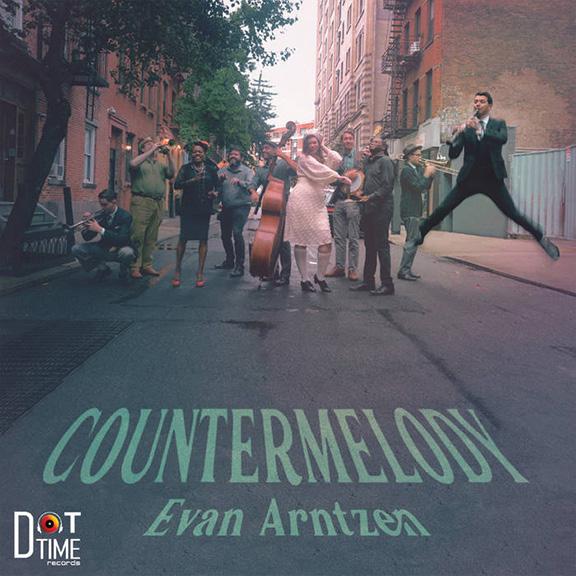
Rebecca Kilgore epitomizes superb taste in all aspects of her artistry. She chooses wonderful songs to sing, many of them too often ignored gems. Her phrasing is sublime, and her vocalizing rests easily on your ears. The Rebecca Kilgore Trio – Vol. 1 (Heavywood – 1993) nicely illustrates all of this. She is joined by a couple of other Portland-based jazzers, pianist Randy Porter and bassist Tom Wakeling, for an eclec -
NJJS.ORG 37 APRIL • 2021 JERSEY JAZZ
OTHER VIEWS
tic 13-tune program, with her husband, Dick Titterington, adding his cornet on a couple of selections. The most familiar songs present are “Day In-Day Out” and “There’s a Small Hotel.” She is attracted to songs written by folks from the jazz world, “Dear Bix” by Dave Frishberg, “Somebody Just Like You” by Meredith D’Ambrosio and Dan Davis, “I Wanna Get Married” by Nellie Marie McKay, “Like the Brightest Star” by Harry Allen and Greg Oppenheimer, and a medley of AzureTe” by Wild Bill Davis and Don Wolff with “Azure” by Duke Ellington and Irving Mills. A forgotten tune from Springtime in the Rockies by Harry Warren and Mack Gordon, “Run, Little Raindrop, Run,” proves well worth revisiting. rebeccakilgore.com
Sings Irving Berlin (SteepleChase – 33143) is a marvelous compendi -

um of Berlin melodies sung by Yaala Ballin . It is based on a show she has performed titled His Name Was Israel Baline , built around songs written by Berlin. Assisting her in exploring the Berlin catalog are pianist Michael Kanan, guitarist Chris Flory, and bassist Ari Roland. Ballin, originally from Israel, has evolved as one of the best jazz vocalists on the New York City scene, and she is a perfect
choice to give Berlin the kind of sensitive and perceptive readings of his lyrics they deserve. In addition to expected selections such as “It’s a Lovely Day,” “Blue Skies,” “Remember,” “Change Partners” and “Cheek to Cheek,” she includes less frequently heard songs like “Be Careful, It’s My Heart,” “How Many Times,” “This Year’s Kisses” and “Fools Fall in Love.” Kanan, Flory and Roland provide just the right musical bed for Ballin’s vocalizing. amazon.com
It has been a long time since the catchphrase “Big bands are dead!” first arrived, but luckily there are enough musicians on the scene who refuse to accept this canard and plow ahead with carrying on the big band tradition. One example is Steven Feifke. His New York City-based Steven Feifke Big Band is an aggregation of top New York jazz musi -



NJJS.ORG 38 MAY 2021 JERSEY JAZZ
ORIGINAL VINYL REC RDS ALBUMS • 45s • 78s • CDs DVDs • CASSETTES • 8-TRACKS OPEN SEVEN DAYS A WEEK M O N D AY T H R U S U N D AY N O O N T O 5 P M 314 STATE ROUTE 94 SOUTH #7 WARWICK CROSSING WARWICK, NEW YORK N.Y. 10990 ORIGINALVINYLRECORDS.COM E-MAIL: ORIGINALV NYLRECORDS@GMA L COM PHONE 845-987-3131 GIFTCARDSAVAILABLE eigo_3.25x9ad_newjerseyjazzsociety_ovr_final_Layout 1 2/22/21 5:55 P
OTHER VIEWS
“ VOCALIST LAUREN WHITE PACKS AN INTENSE EIGHT-SONG PROGRAM INTO ABOUT ONE HALF-HOUR OF FINE SOUNDS ”
plus vocalist Beth Kuhn on half of the 14 tracks. Most of the program has standards such as “My Funny Valentine,” “Where or When,” “Invitation,” “On the Street Where You Live,” “If I Were a Bell” and “That’s All.” Shelton contributed three originals, including the title track. There is no new ground broken here, but the music is welcoming and a good listen. davesheltonjazz.com
cians playing his charts on Kinetic (Outside in Music – 2112). There are seven original tunes plus “Nica’s Dream,” “Until the Real Thing Comes Along”, and “On the Street Where You Live,” the latter two of which have vocals by Veronica Swift. Feifke has provided imaginative arrangements played with precision by the band. He has provided ample solo space for a variety of impressive soloists. stevenfeifkemusic.com
Jazz has a way of getting into one’s soul. Pianist Dave Shelton has played piano from his youth and, while studying for his MBA, became drawn to jazz. Despite becoming a successful venture capitalist, he continued to play piano when opportunities presented themselves, eventually performing regularly as a professional jazz pianist. Drift (Self-produced) features his trio with Rick Shandling on bass and Mike Staron on drums,
It is rare to find a young vocalist who exhibits the maturity in her interpretation of songs that Anais Reno provides on Lovesome Thing: Anaïs Reno sings Ellington & Strayhorn (Harbinger – 3701). When she recorded this album, Reno was only 16-years old. It is amazing to hear her sing “Lush Life,” but the reality is that Billy Strayhorn was not much older when he wrote the song. Her choice of songs is
Specializing in Media Campaigns for artists, labels, venues and events

NJJS.ORG 39 APRIL • 2021 JERSEY JAZZ
J i m E i g o J a z z P r o m o S e r v i c e s 2 6 9 S R o u t e 9 4 Wa r w i c k , N Y 1 0 9 9 0 T : 8 4 5 - 9 8 6 - 1 6 7 7 F : 8 4 5 - 9 8 6 - 1 6 9 9 E - M a i l : j a z z p r o m o @ e a r t h l i n k . n e t
P r o m o t i o n / M a r k e t i n g D i s t r i b u t i o n / C o n s u l t a t i o n w w w . j a z z p r o m o s e r v i c e s . c o m Jazz Promo
Services
OTHER VIEWS
interesting. There are some tunes that are often found in collections like this such as “Caravan,” “Mood Indigo,” “I’m Just a Lucky So and So,” “Day Dream” and “Take the ‘A’ Train.” Then there are some rarities, “Still in Love,” “It’s Kind of Lonesome Out Tonight’ and “All Roads Lead Back to You,” a version of “Lotus Blossom” with lyrics by Allen Roy. She does a stunning medley of “Chelsea Bridge,” with a wordless vocal, and “A Flower Is a Lovesome Thing.” In all of this, she is supported by Emmet Cohen on piano, Russell Hall on bass, and Kyle Poole on drums with occasional contributions from Tivon Pennicott on sax and Juliet Kurtzman on violin. This is not only an impressive debut recording by Anaïs Reno, but deserves to be on any list of best vocal albums of the year. harbingerrecords.com

The liner notes by Andrew Gilbert give the background to the songs comprising Round Midnight – Re-Imagined (Amber Inn – No catalog number) the new release from vocalist Amber Weekes , who was raised in Harlem but now is based in Los Angeles. Weekes used the experiences of her formative years as the guide to her song selection for this album. The songs range from
the humorous and earthy, “Hazel’s Hips” and “Don’t You Feel My Leg” to the prayerful nod to her mother, “Cristo Redentor”/ “I Want Jesus to Walk with Me.” She is sensitive in combining Sting’s “Sistermoon” and the Gershwins’ “Summertime.”
Her intelligent sense of medley is also present in what she terms “The Bar Suite,” a trio of songs that includes “Something Cool,” “One for My Baby” and “The Man That Got Away.” There is a variety of musicians backing her from track to track, but the album has a nice feeling of unity. amberweekes.com
Though brief, Ever Since the World Ended (Café Pacific – 5020) by vocalist Lauren White packs an intense eight-song program into about one half-hour of fine sounds. Backed by the Quinn Johnson Trio— Johnson on piano, Trey Henry on
bass and Ray Brinker on drums— White is equally accomplished at swinging or getting into the depths of a ballad. She has a pleasant voice that captures the emotion of each selection. Only one of the eight selections is from the world of Great American Songbook standards, “Alone Together.” Most of the others have jazz roots, “If You Never Fall in Love with Me” by Sam Jones; “Ever Since the World Ended” by Mose Allison; “Some of That Sunshine” by Karrin Allyson and Christopher Coswell; “Remembering the Rain” by Bill Evans; and “Take Love Easy” by Duke Ellington and John LaTouche. The other two are from the world of pop, “Just the Two of Us” by Bill Withers and “Shattered” by Jimmy Webb. The tunes explore the range of feelings she has experienced during the difficulties of the past year. laurenwhitejazz.com
NJJS.ORG 40 APRIL • 2021 JERSEY JAZZ
41 MAY 2021 JERSEY JAZZ NJJS.ORG
1 6 7 8 9 2 3 4 5 ACROSS 1. What Ella does 6. Kenton’s hard swingin’ drummer 7. Squirrel’s treasure 8. Saxophonists Lee or Kaplan 9. Guitarist Paul DOWN 1. Bassist Stewart’s onomatopoeic nickname 2. Free jazz pianist Taylor 3. Got up 4. They sometimes blow out 5. Info on gov. issued ID Answers on page 42. PUZZLE CONSTRUCTED BY LIN JOSEPHSON
JAZZWORDS

MOSAIC BOX SETS AVAILABLE FOR PURCHASE!
MOSAIC BOX SETS AVAILABLE FOR PURCHASE! T
The New Jersey Jazz Society has acquired a collection of 82 used Mosaic TM Limited Edition CD Box Sets. These were generously donated by members and supporters of NJJS. All of them are out -of-print and the great majority are in either very good or mint condition. Many of these sets are being offered on eBay and Amazon for significantly more than their original selling price. NJJS is offering them at a price to sell quickly.
he New Jersey Jazz Society has acquired a collection of 82 used Mosaic TM Limited Edition CD Box Sets. These were generously donated by members and supporters of NJJS. All of them are out of print and the great majority are in either very good or mint condition. Many of these sets are being offered on eBay and Amazon for significantly more than their original selling price. NJJS is offering them at a price to sell quickly.
Mosaic TM Sets are prized by collectors for their superior audio quality and include beautiful booklets with essays on the music and musicians written by leading jazz scholars and musicians, rare high -quality photographs, and extensive discographical information. Details on the artists and tracks included in each box can be found on allmusic.com or discogs.com
Mosaic TM Sets are prized by collectors for their superior audio quality and include beautiful booklets with essays on the music and musicians written by leading jazz scholars and musicians, rare high quality photographs, and extensive discographical information. Details on the artists and tracks included in each box can be found on allmusic.com or discogs.com
This is a great opportunity to add to your collection while helping NJJS continue to promote and present jazz. If you are interested in owning any of these sets and would like more information, please visit our website at njjs.org under “Donate/Merchandise.”
This is a great opportunity to add to your collection while helping NJJS continue to promote and present jazz. If you are interested in owning any of these sets and would like more information, please visit our website at njjs.org under “Donate/Merchandise.”
JAZZWORDS ANSWERS _ Across: 1. Scats 6. Lewis 7. Acorn 8. Mike 9. Les _ Down: 1. Slam 2. Cecil 3. Awoke 4. Tires 5. SSN



























































